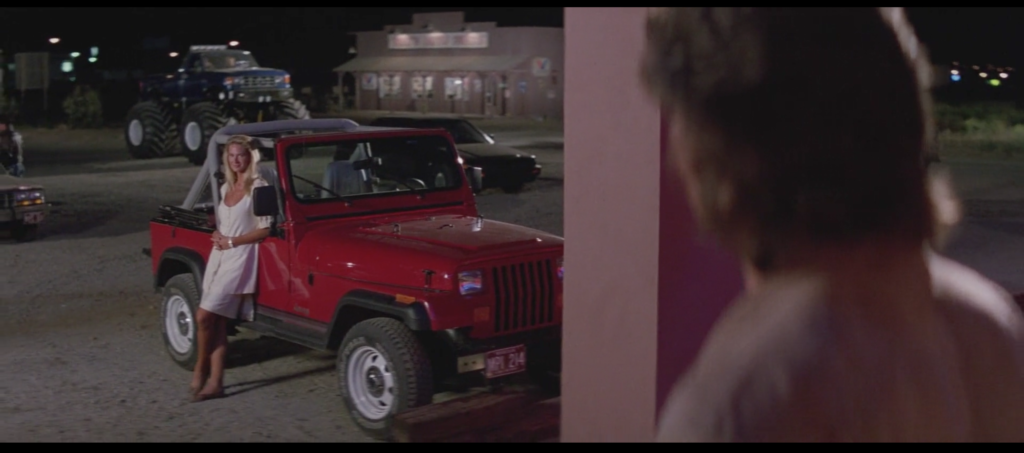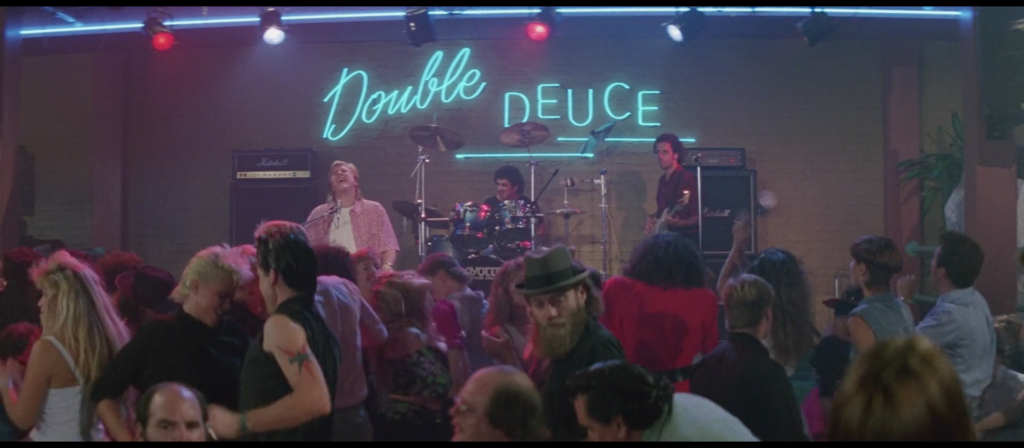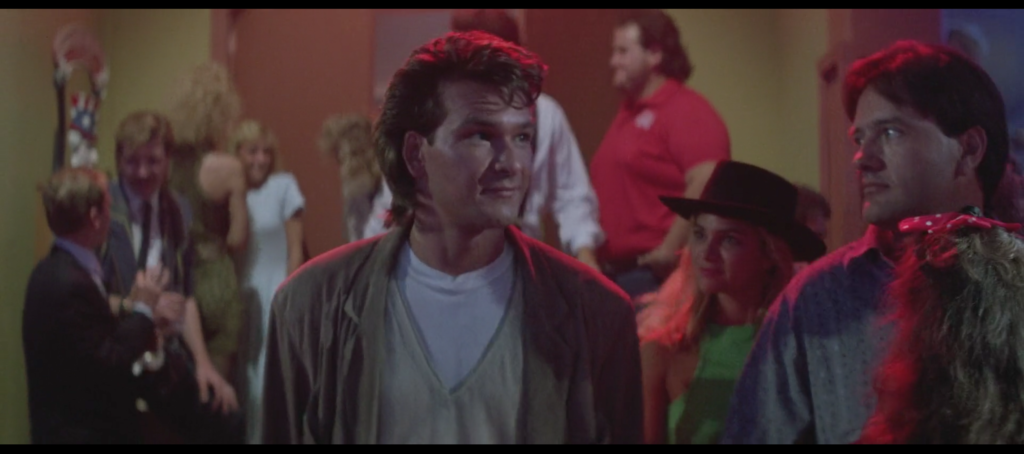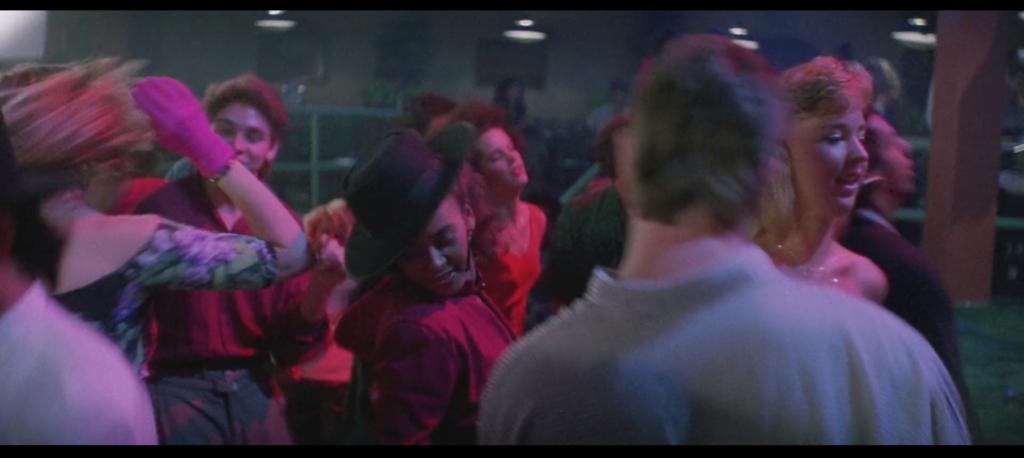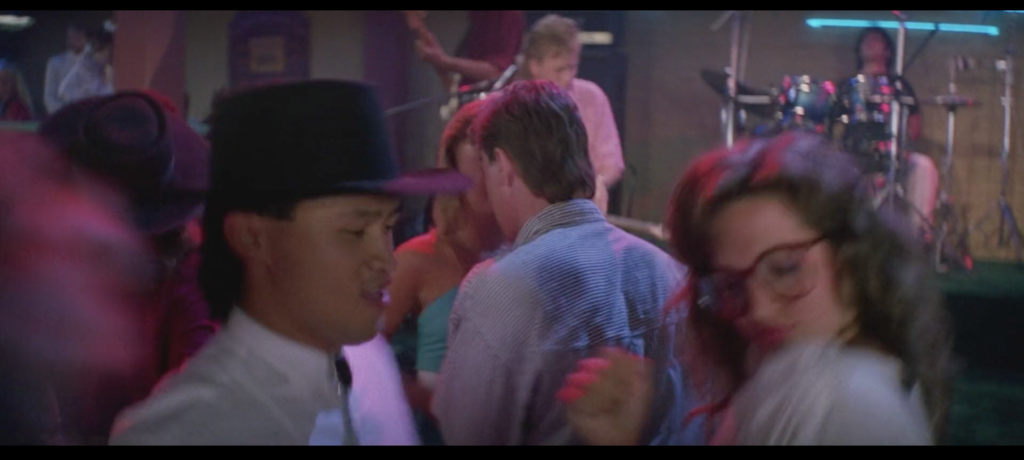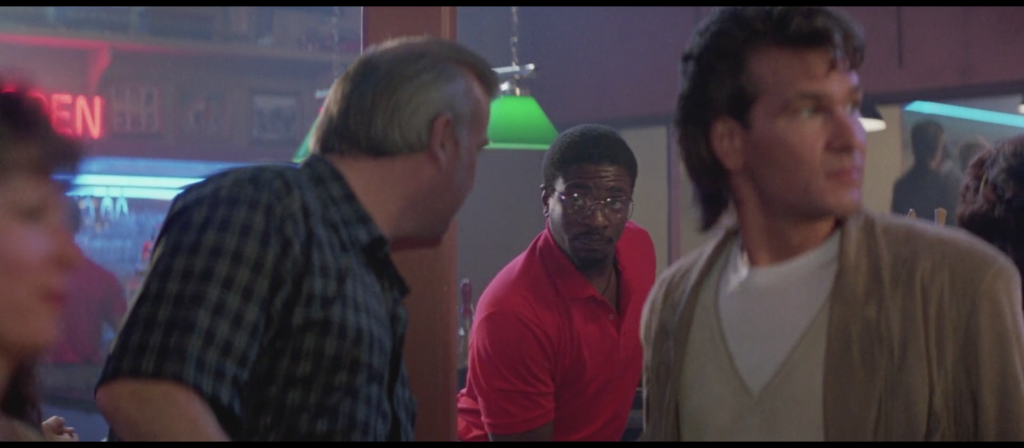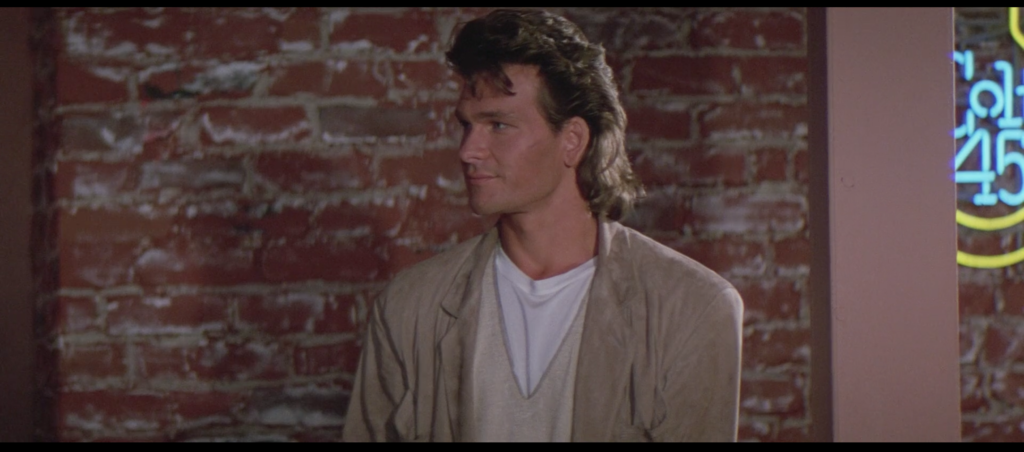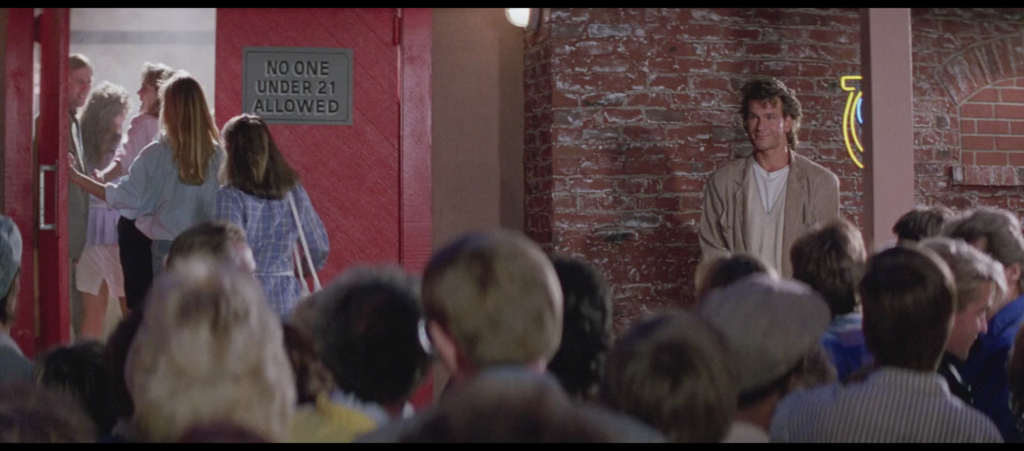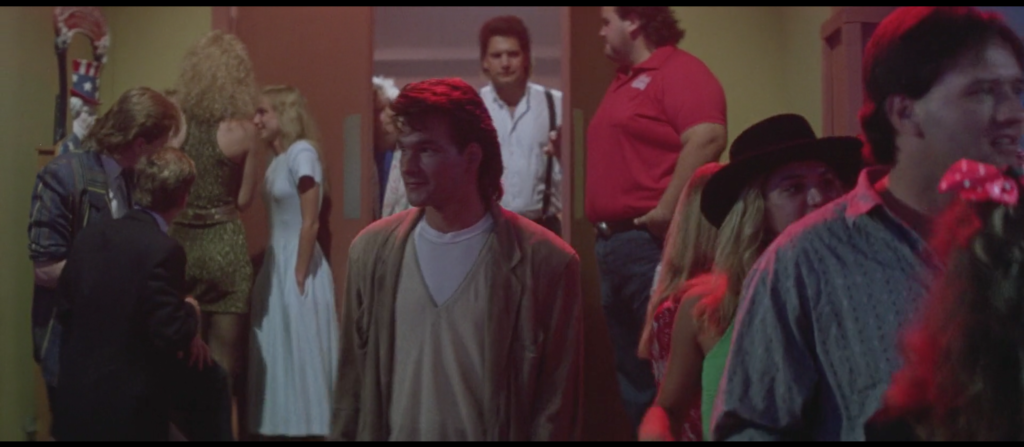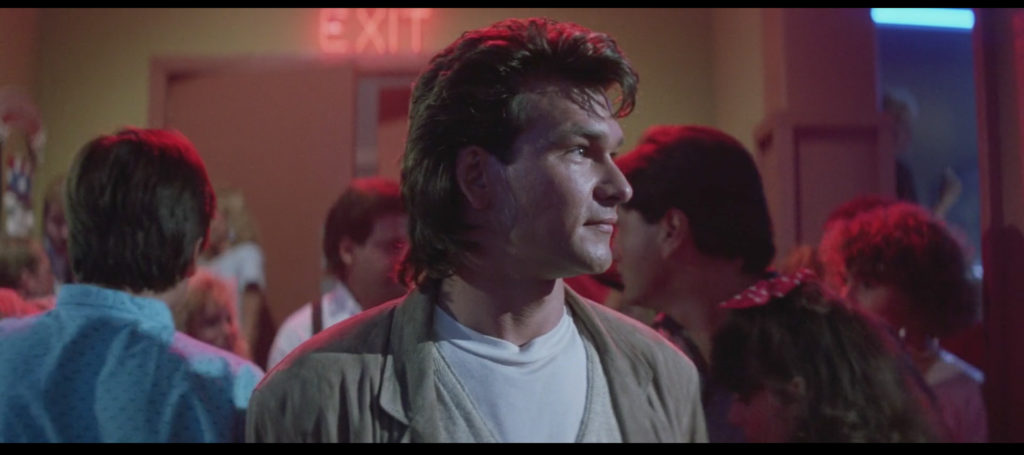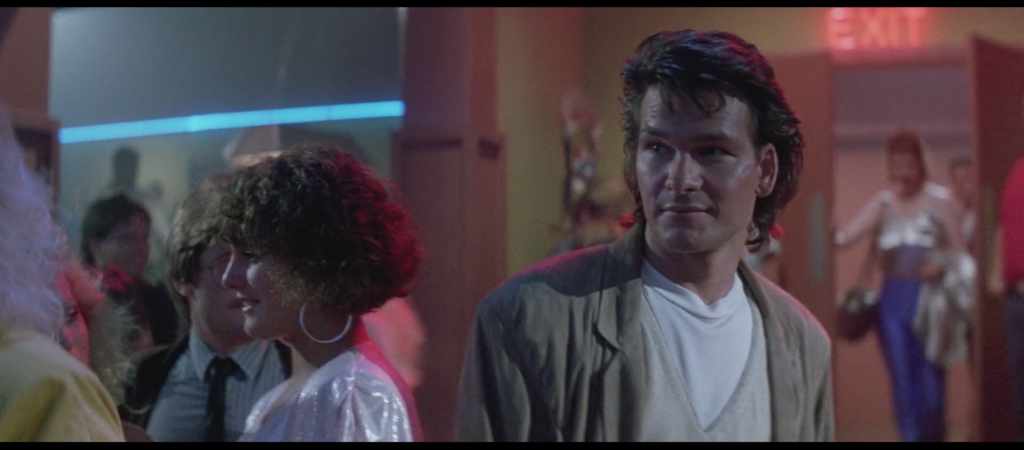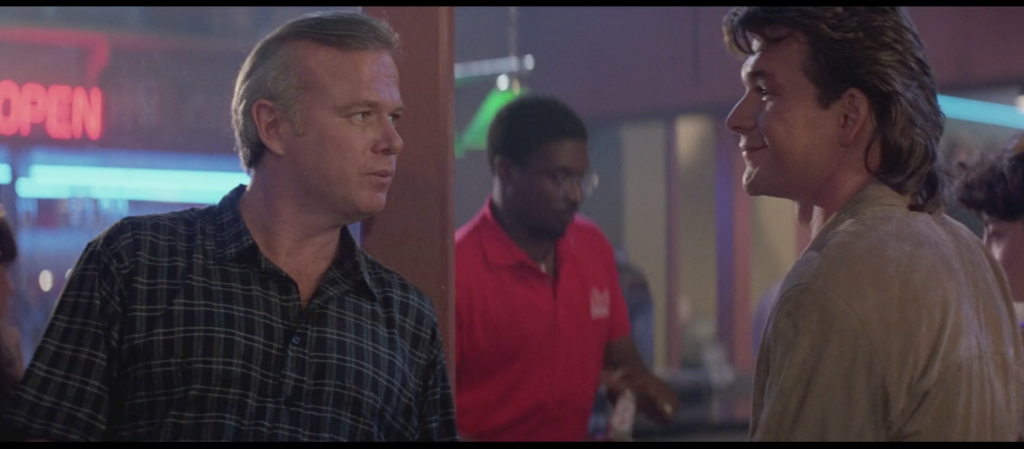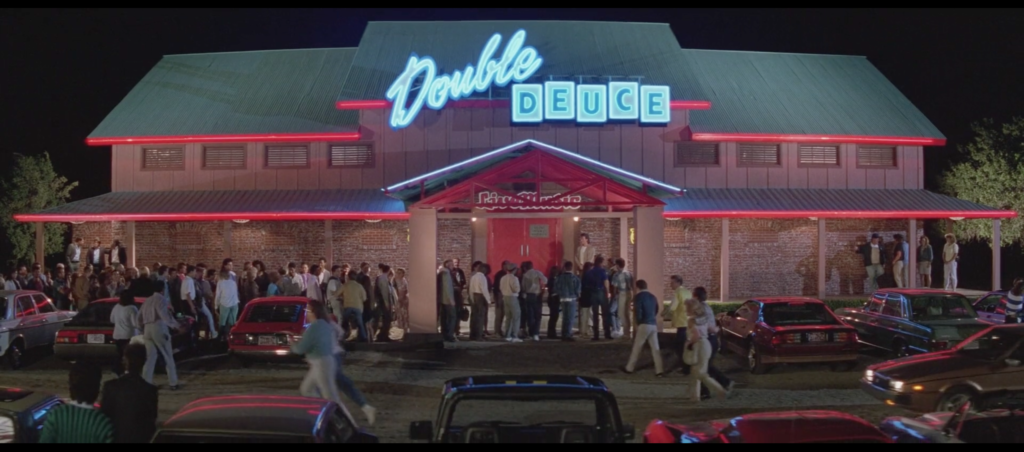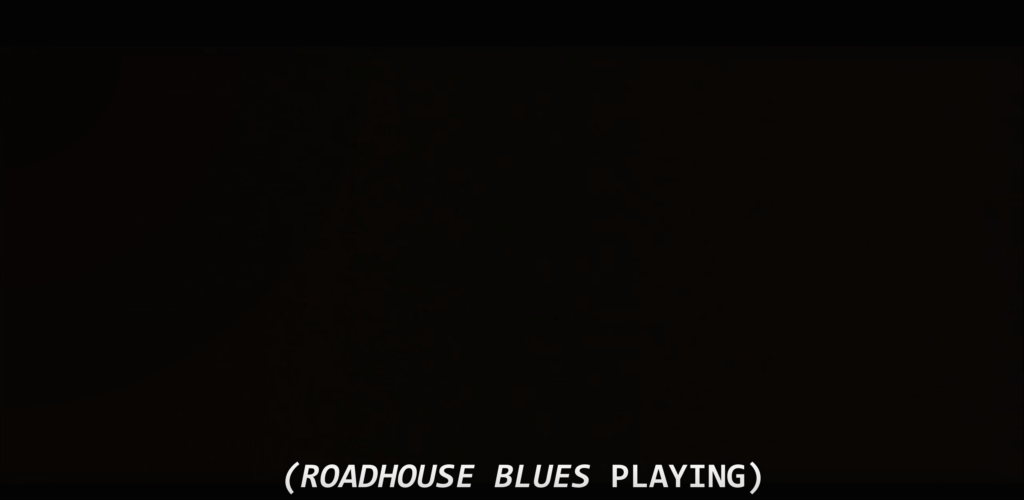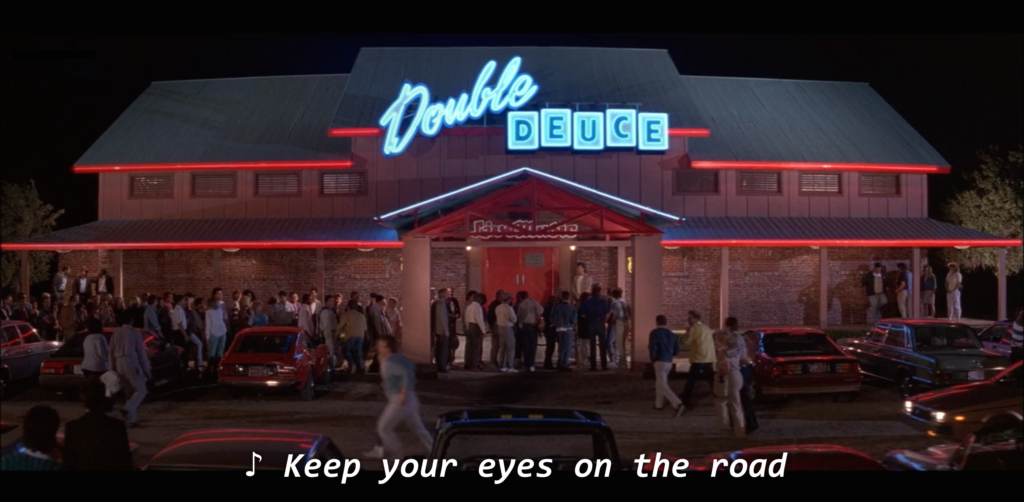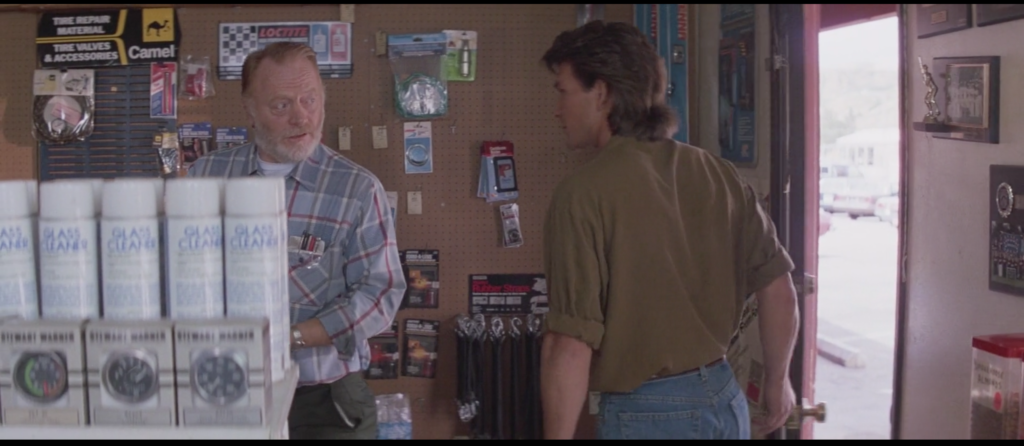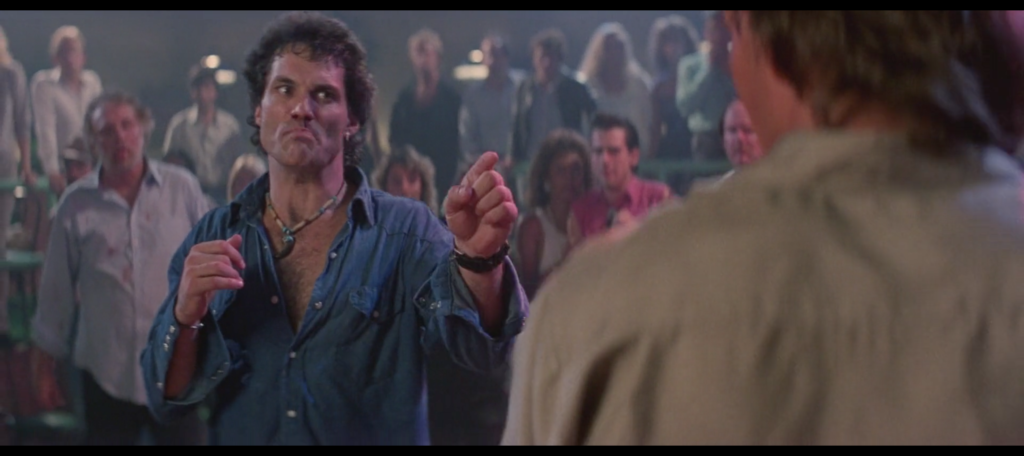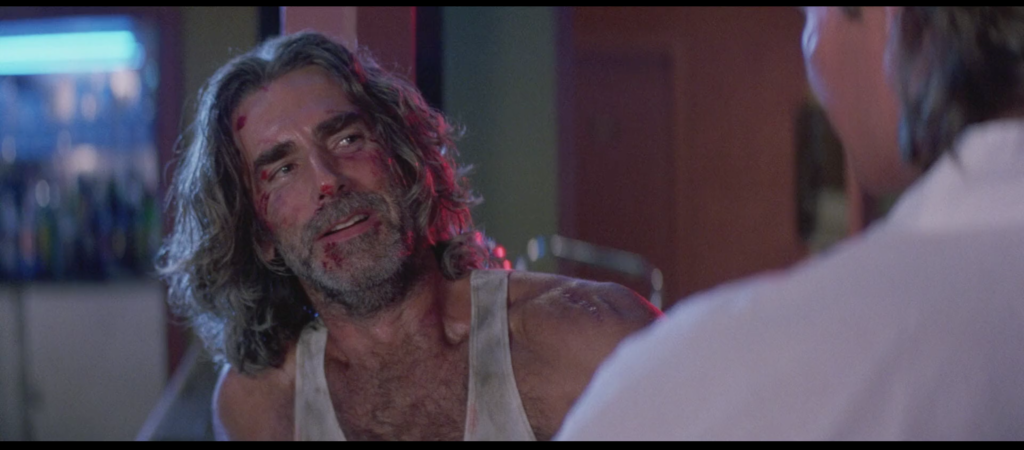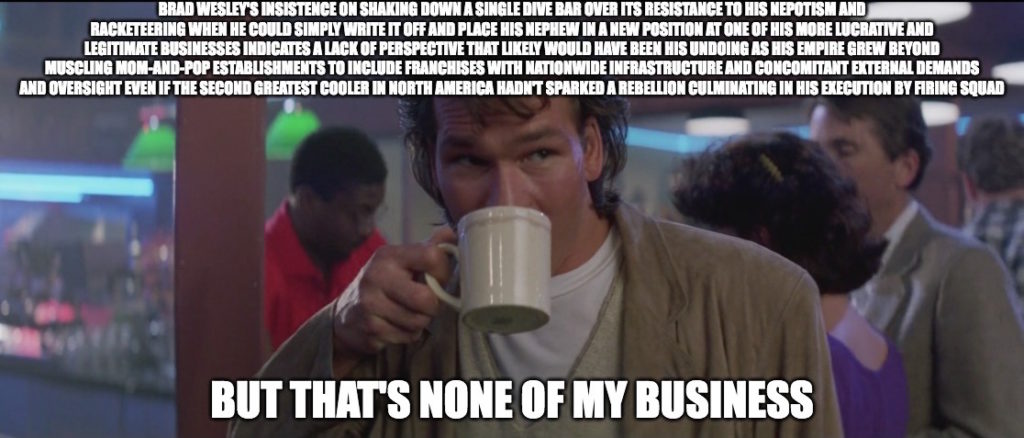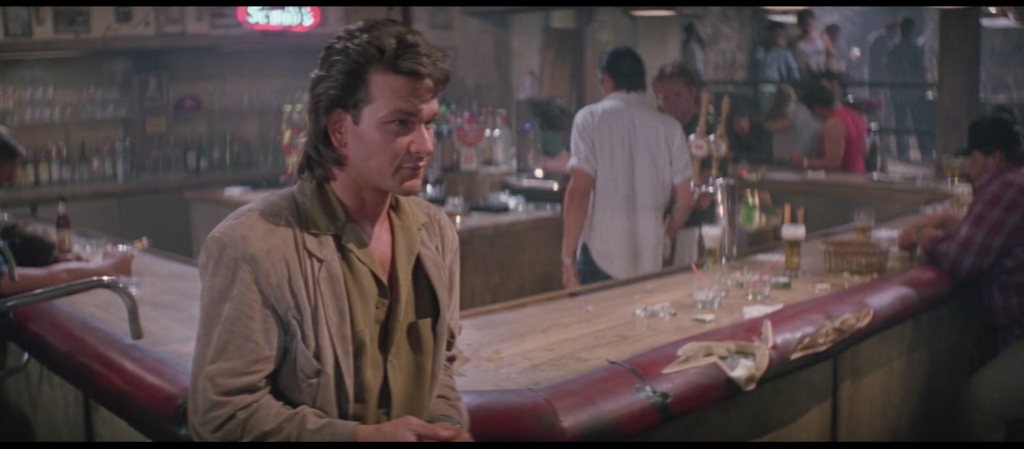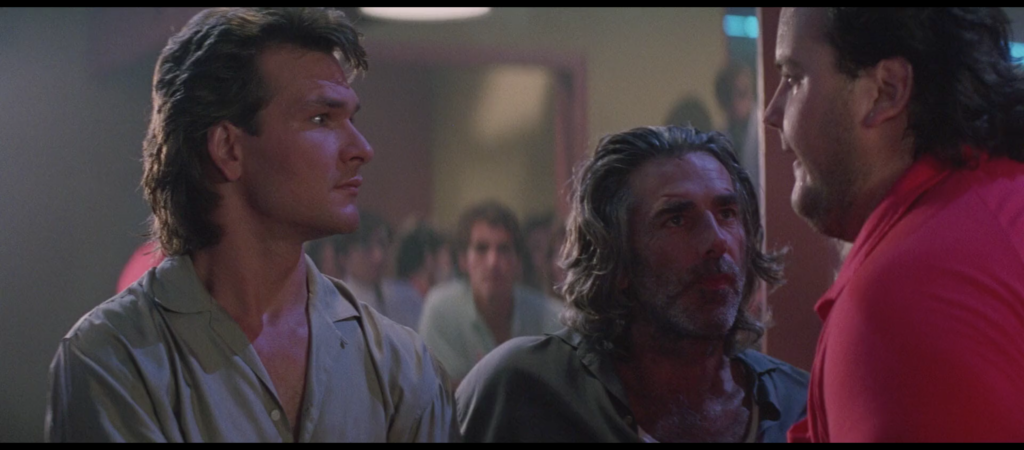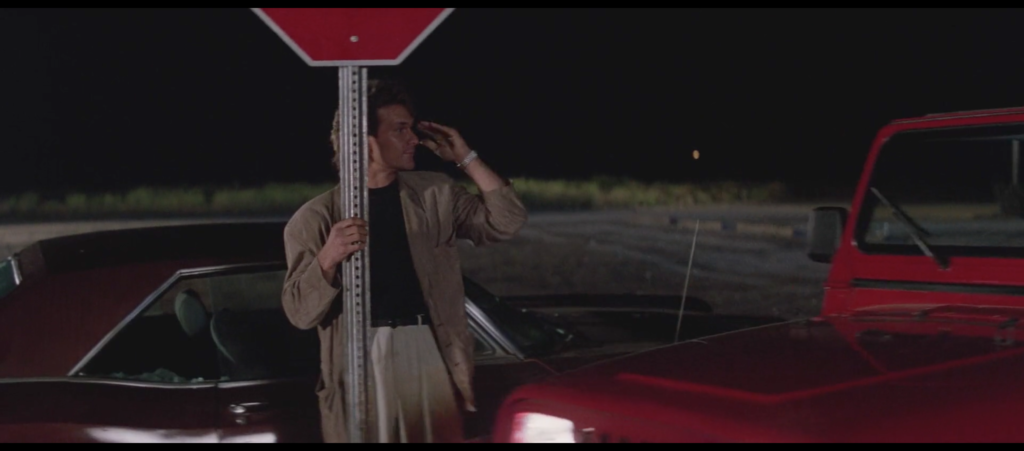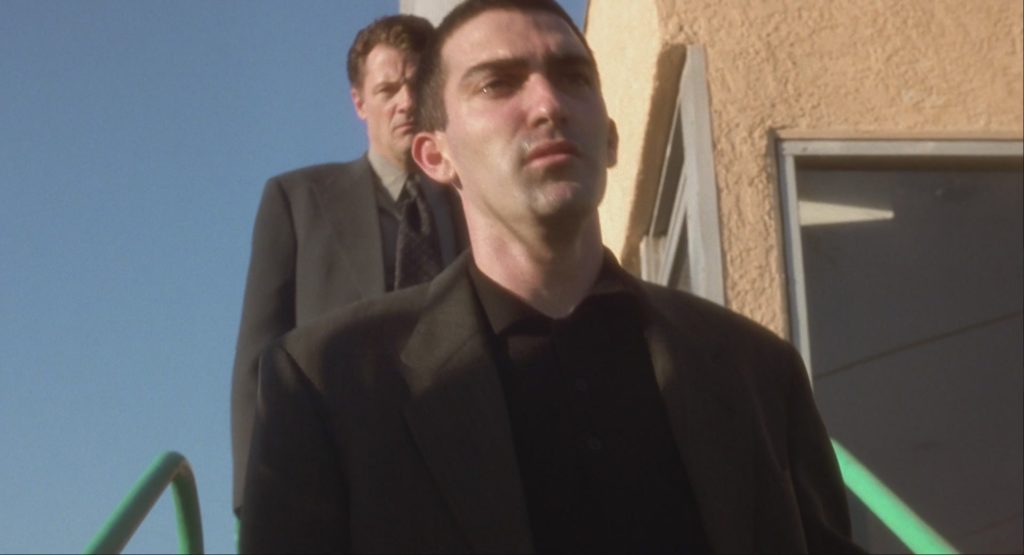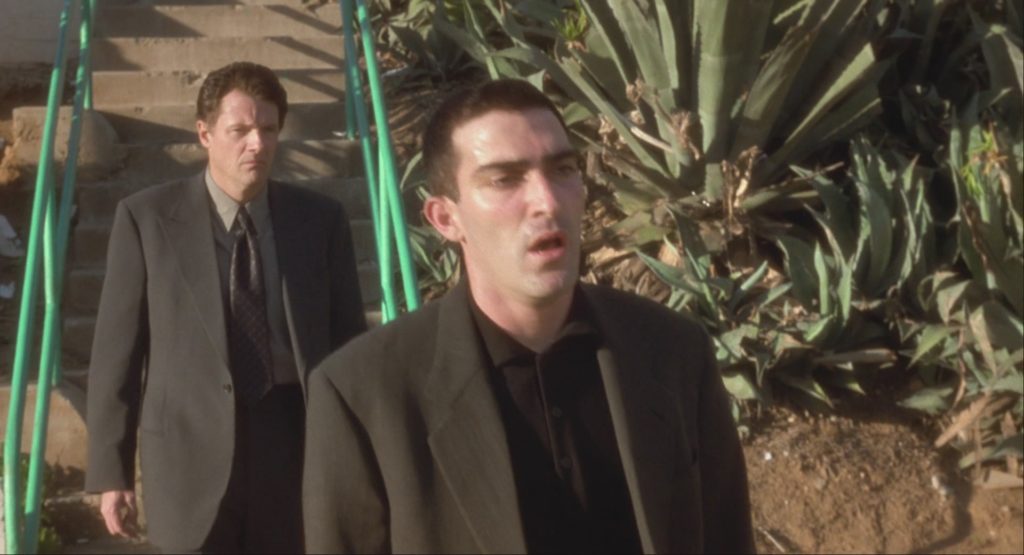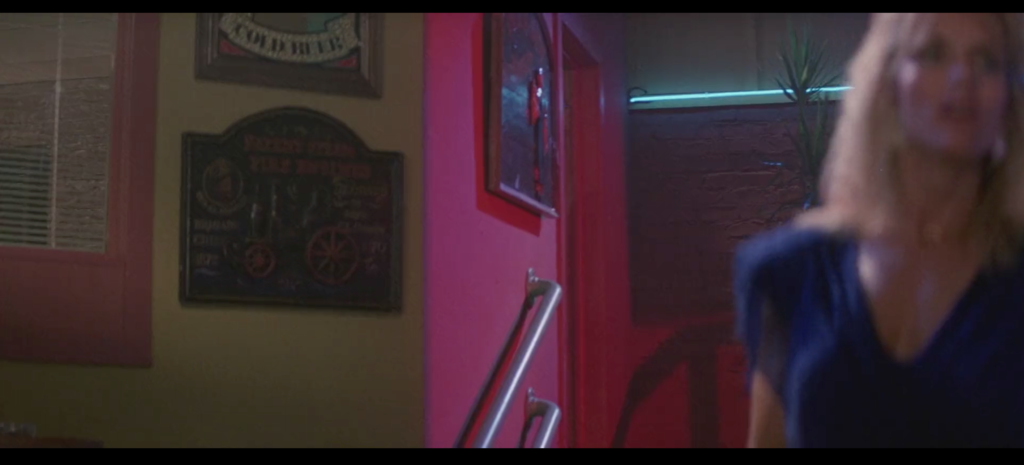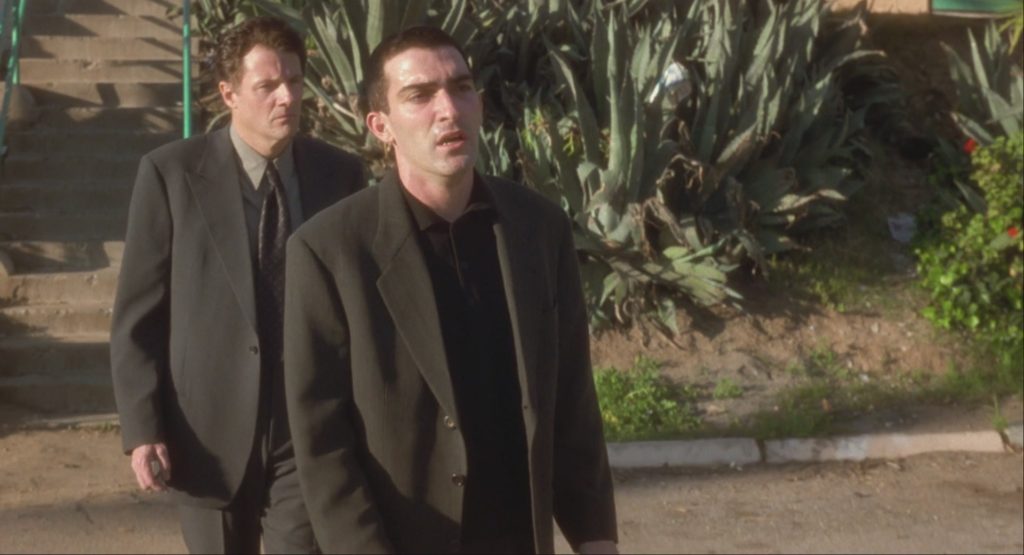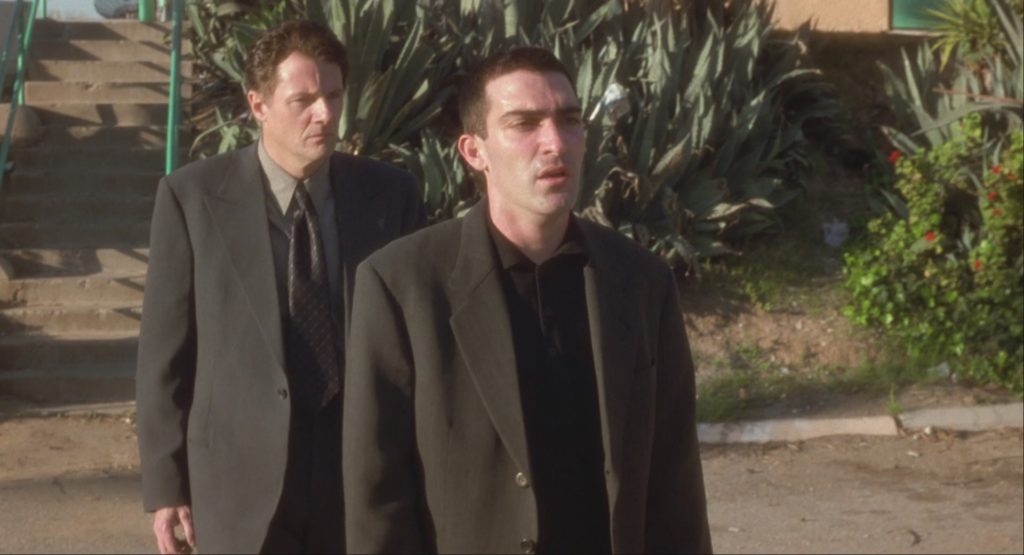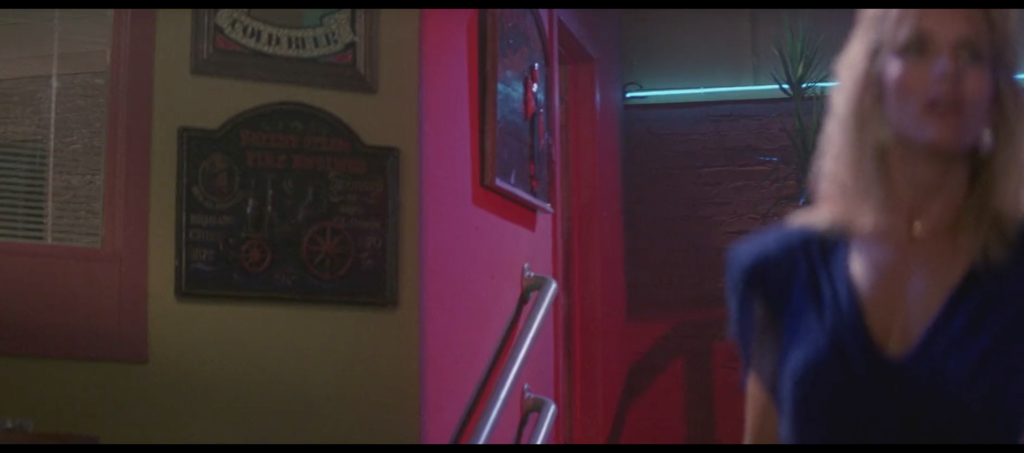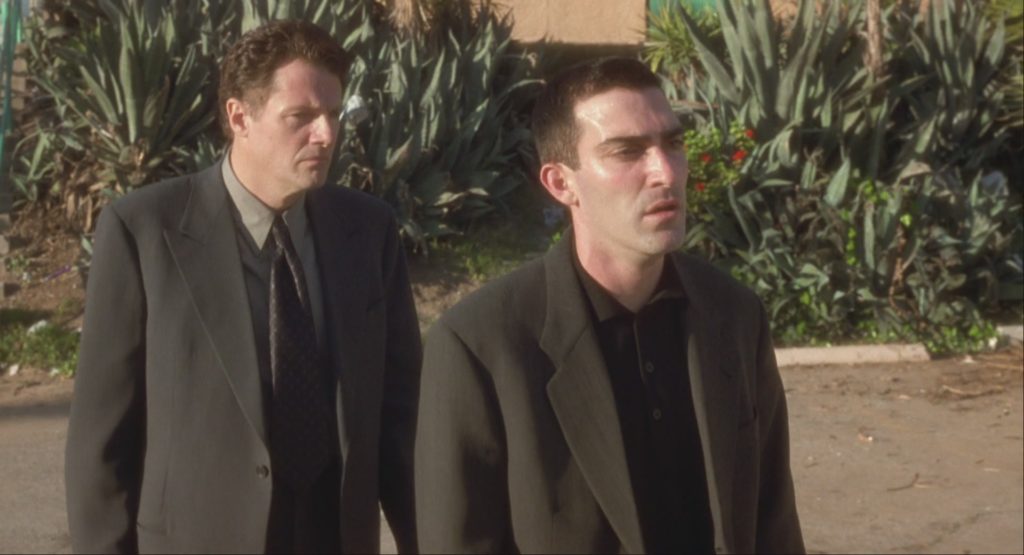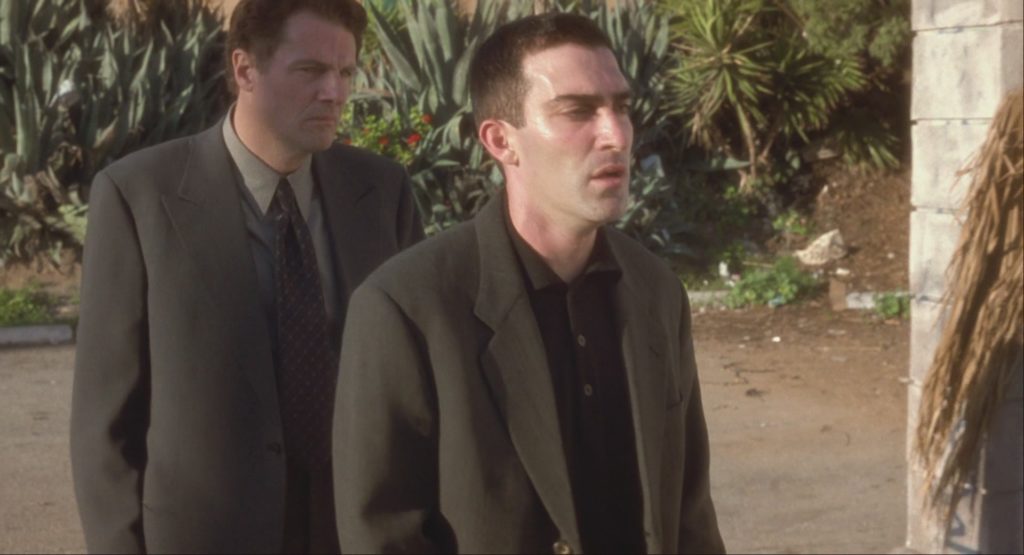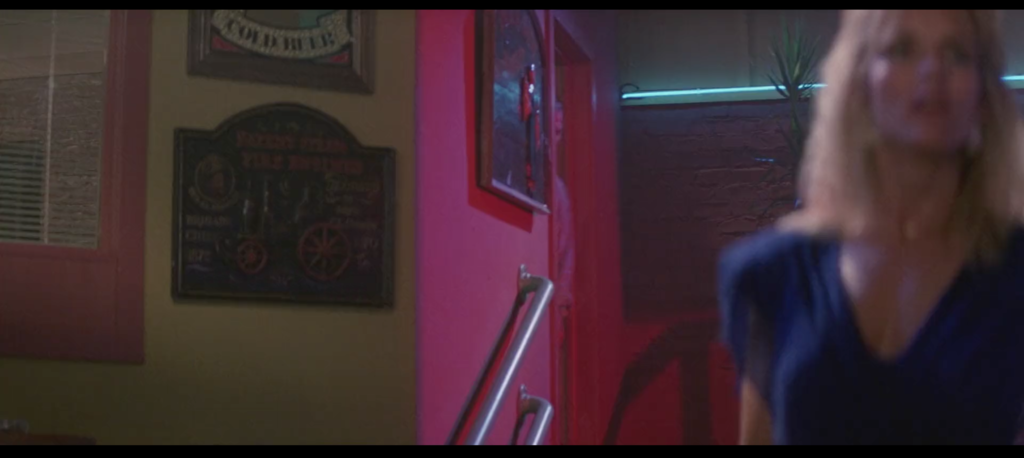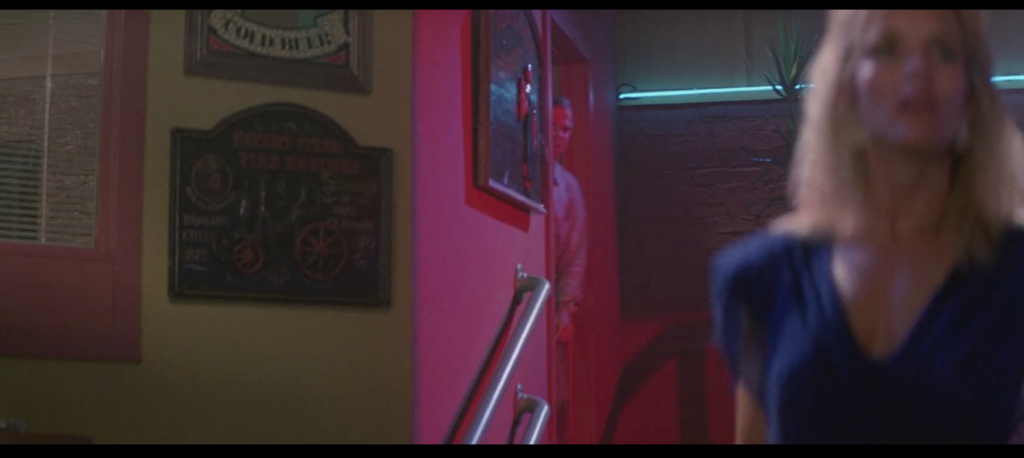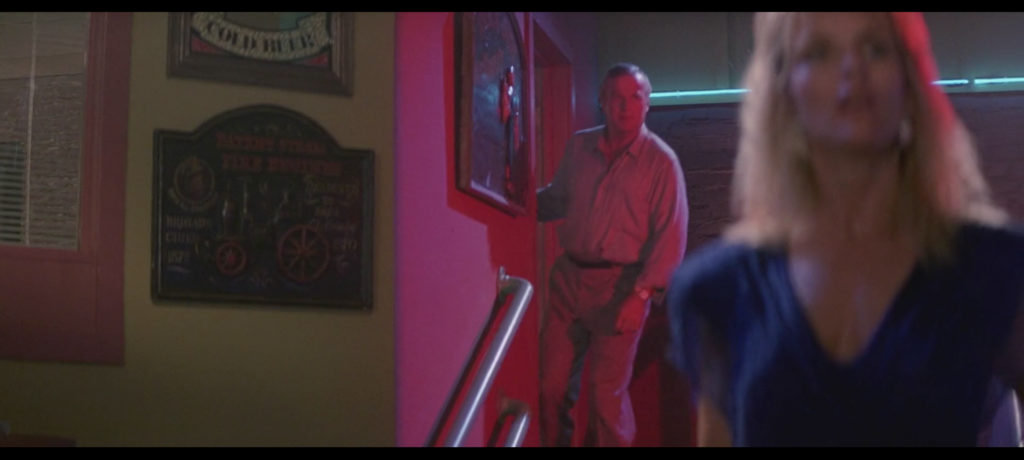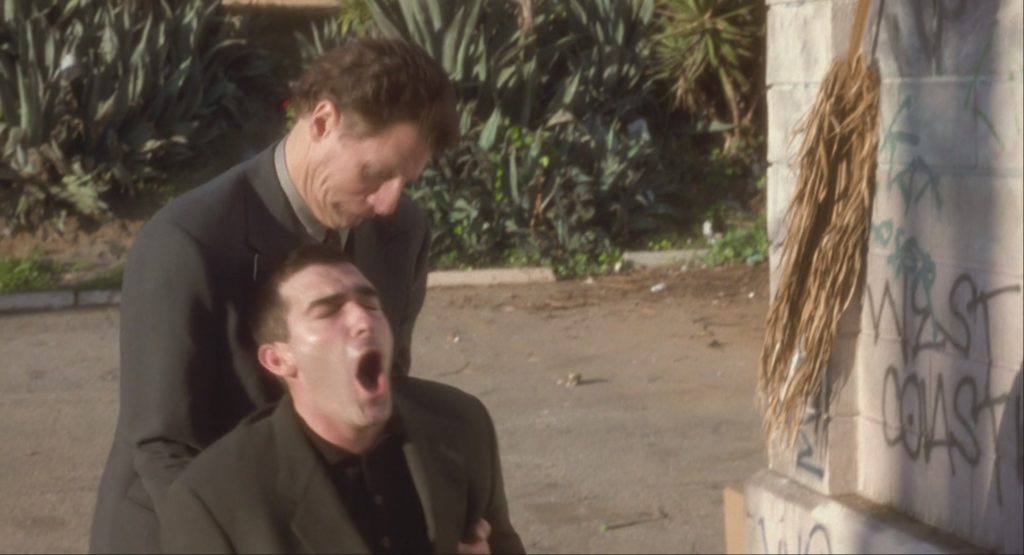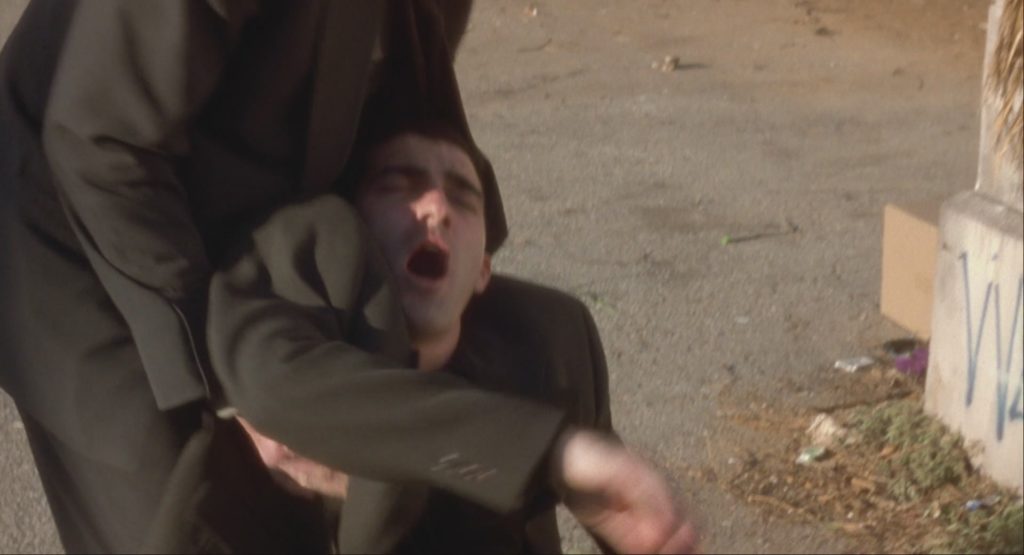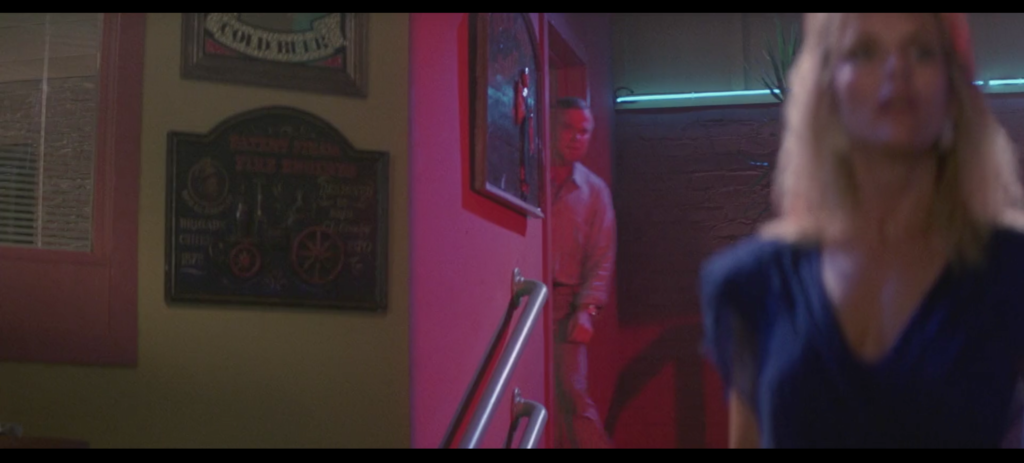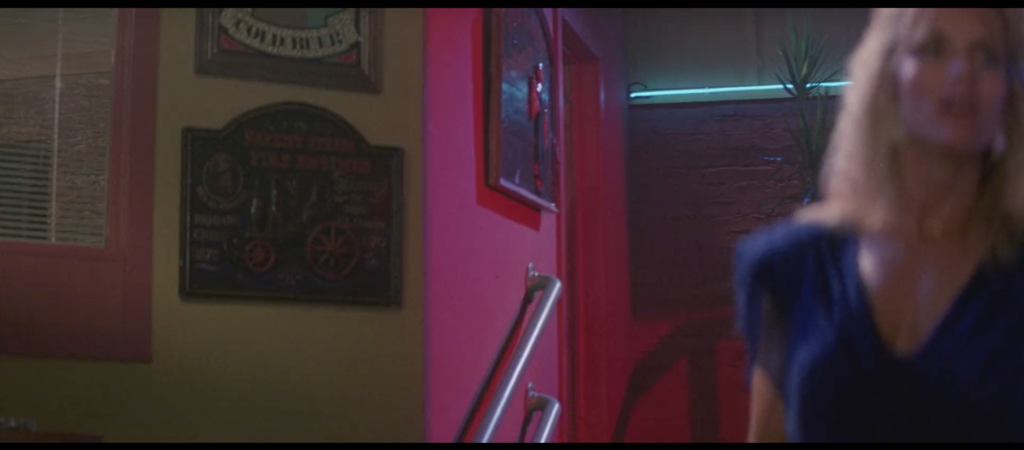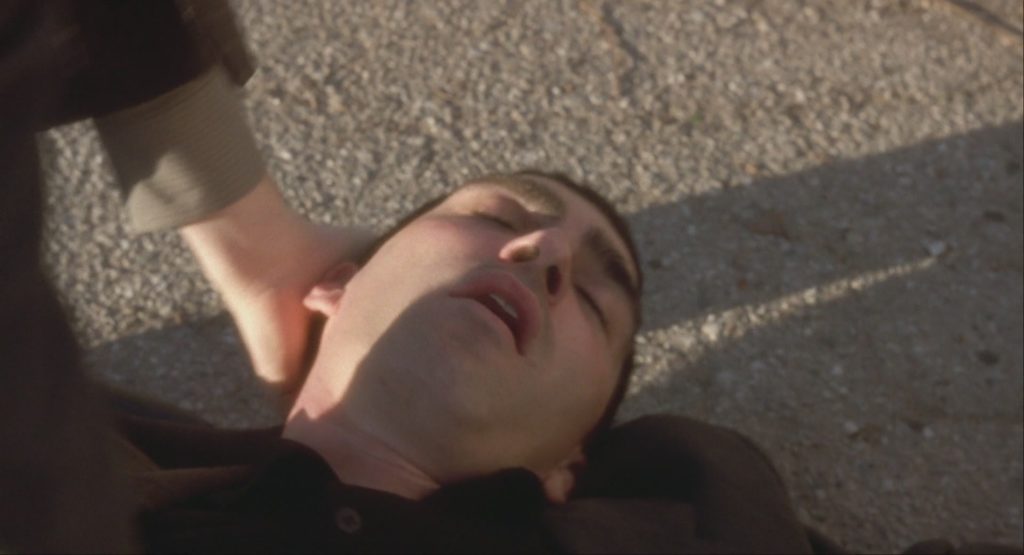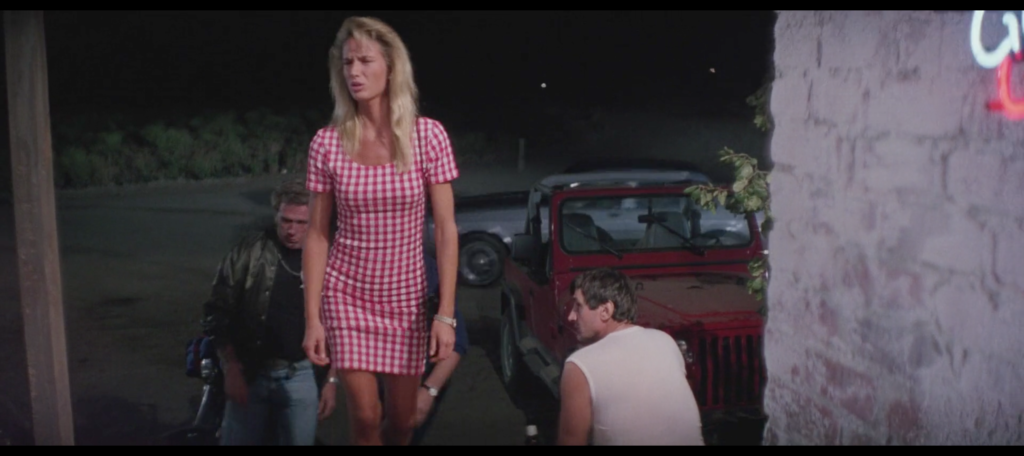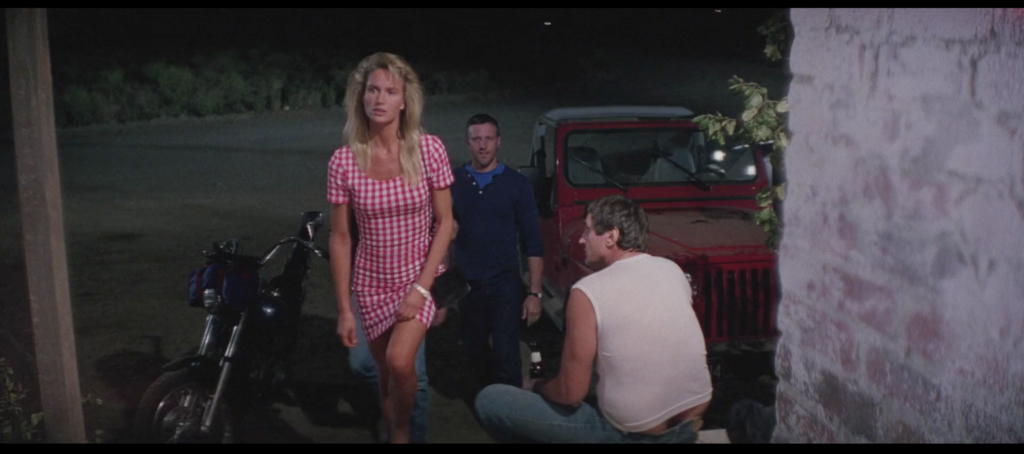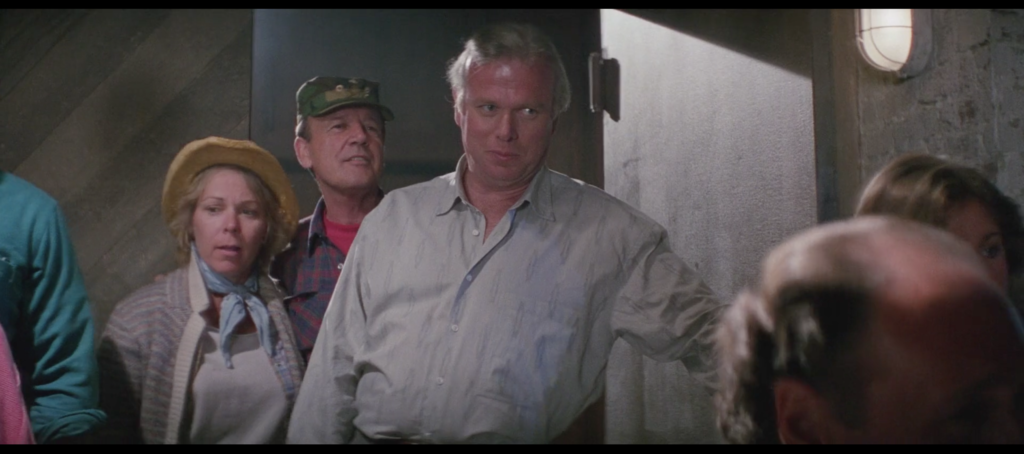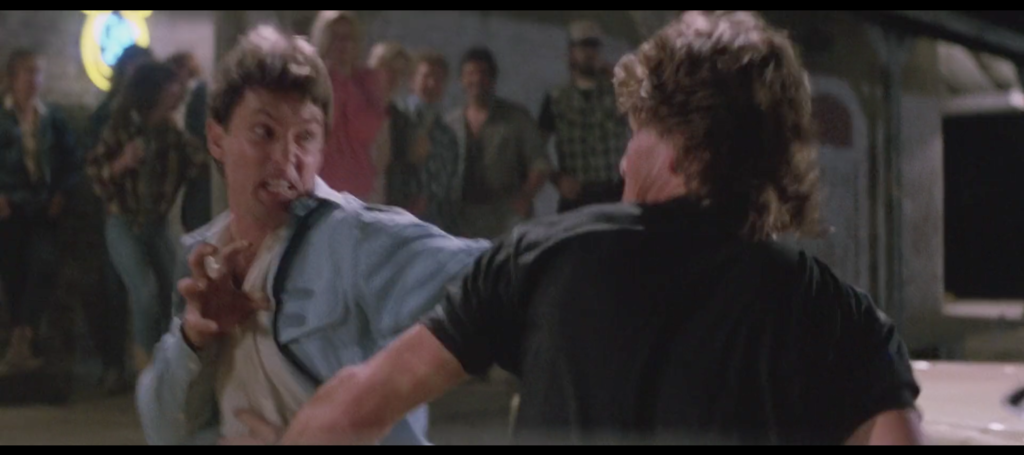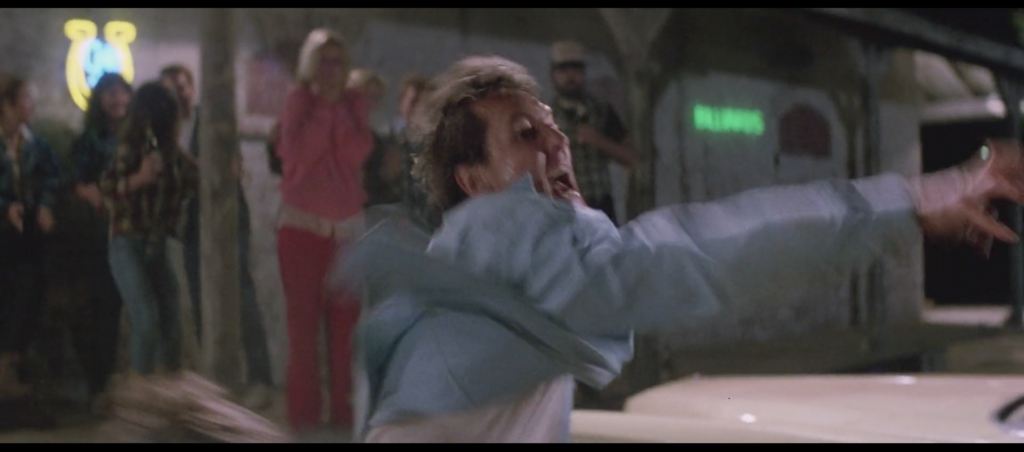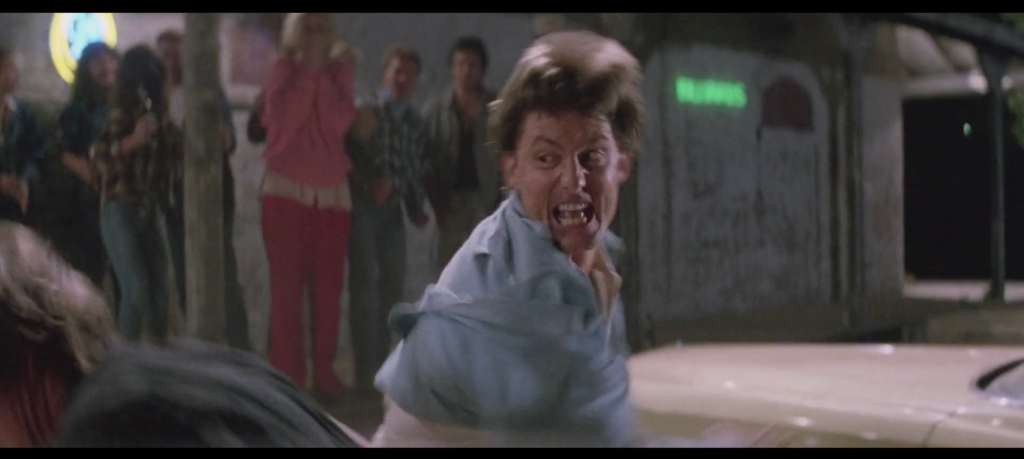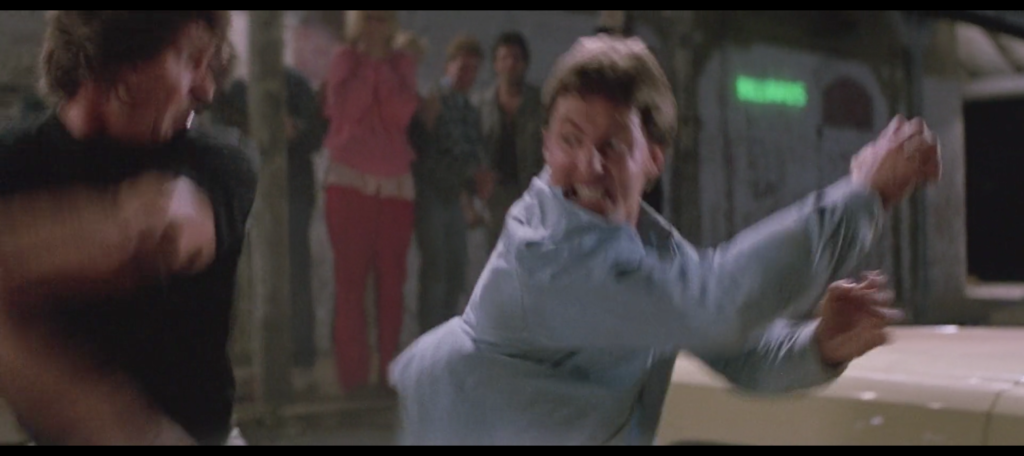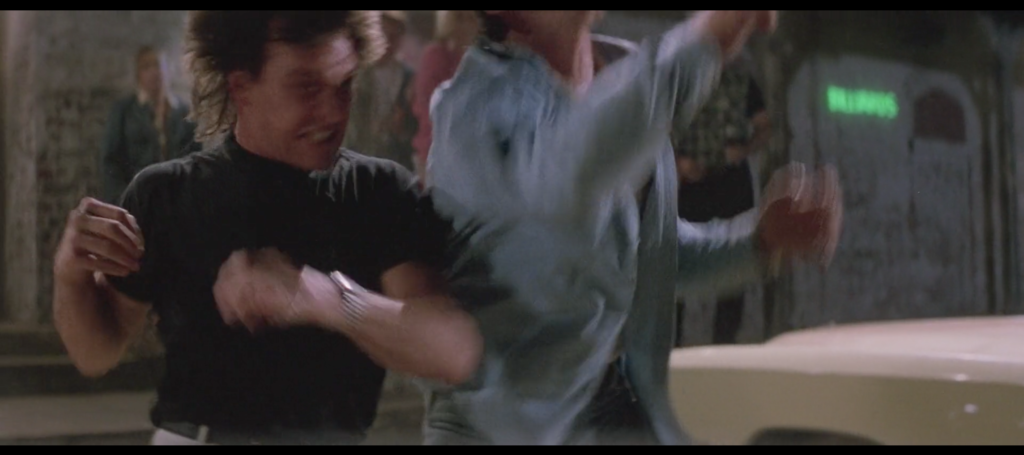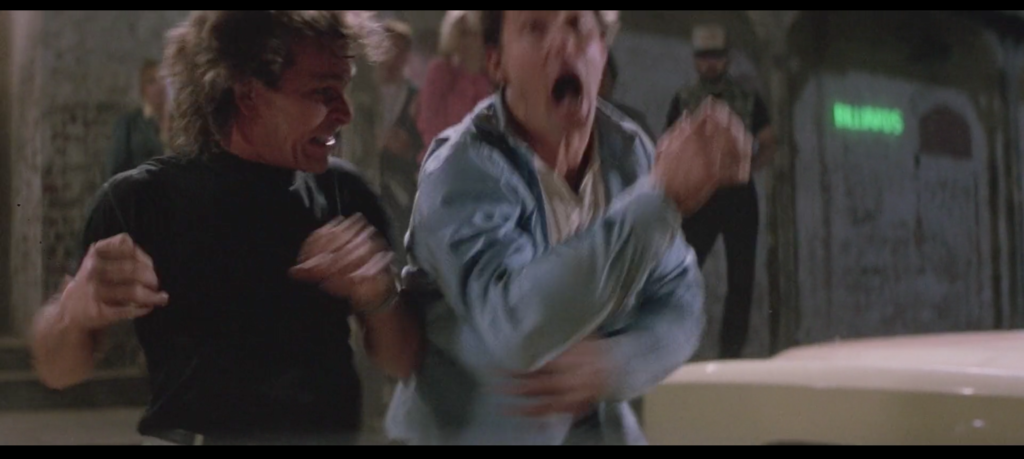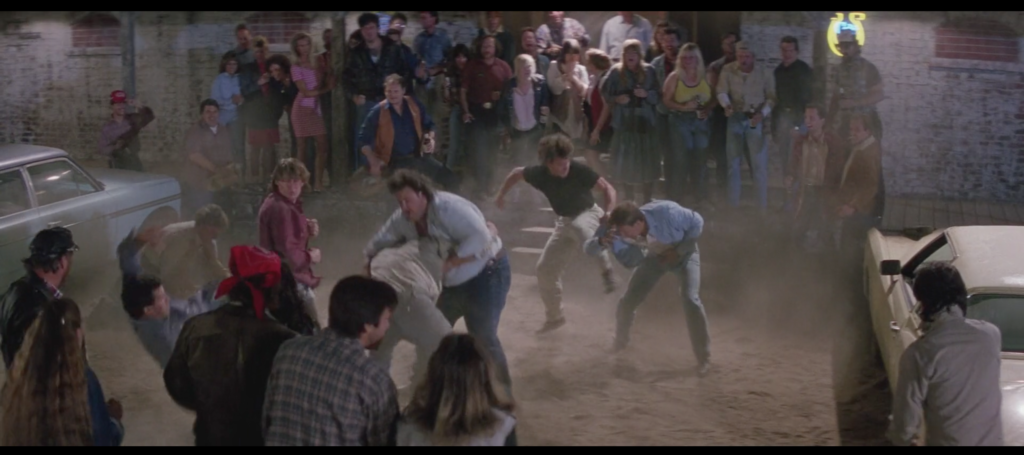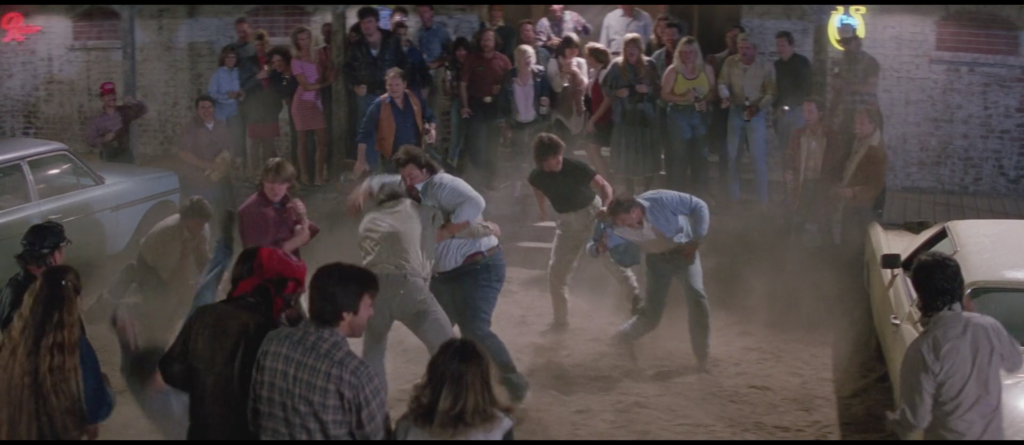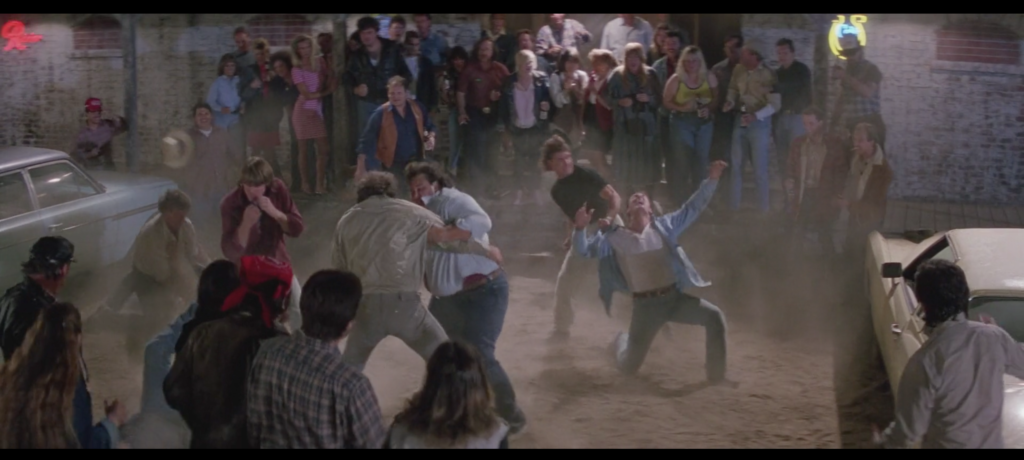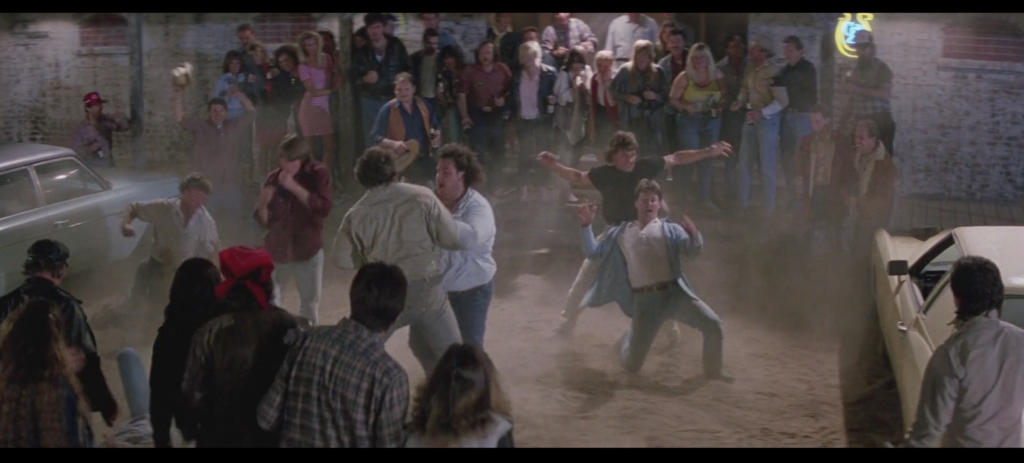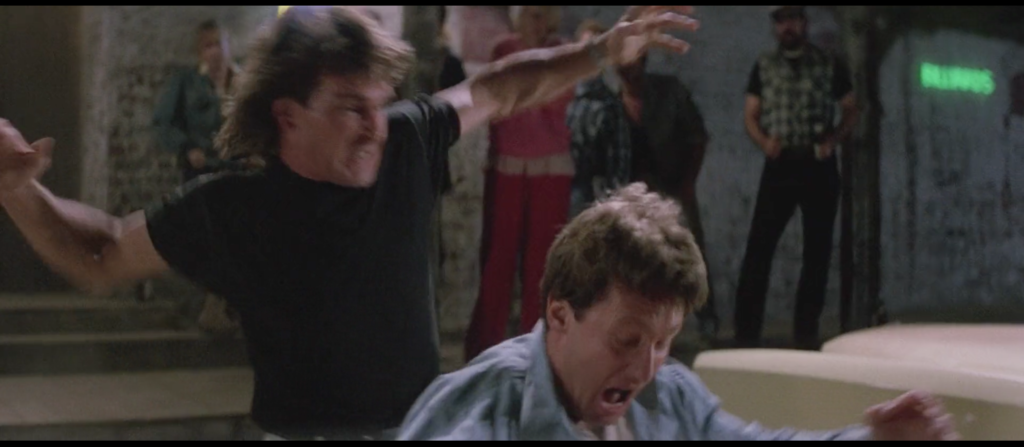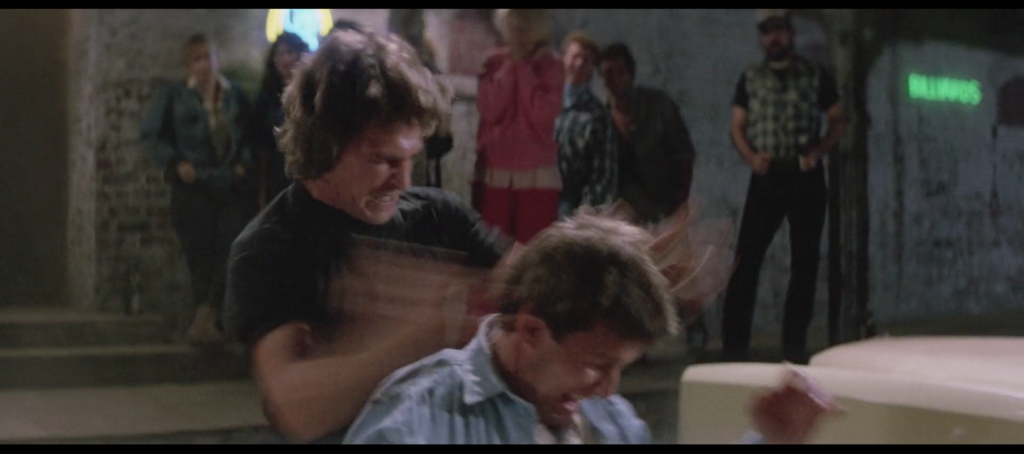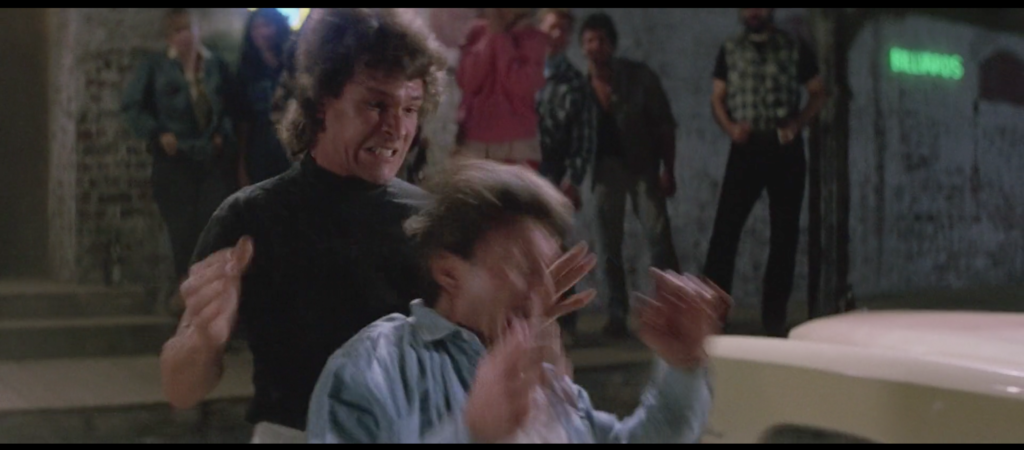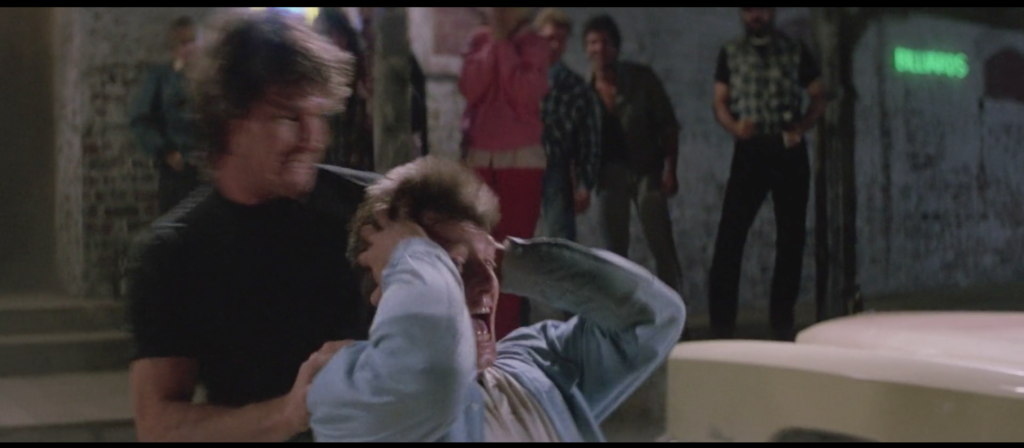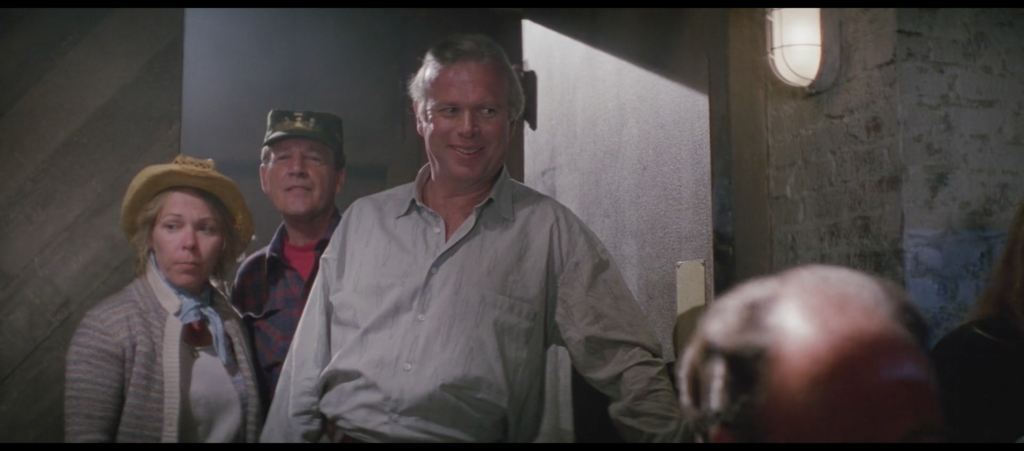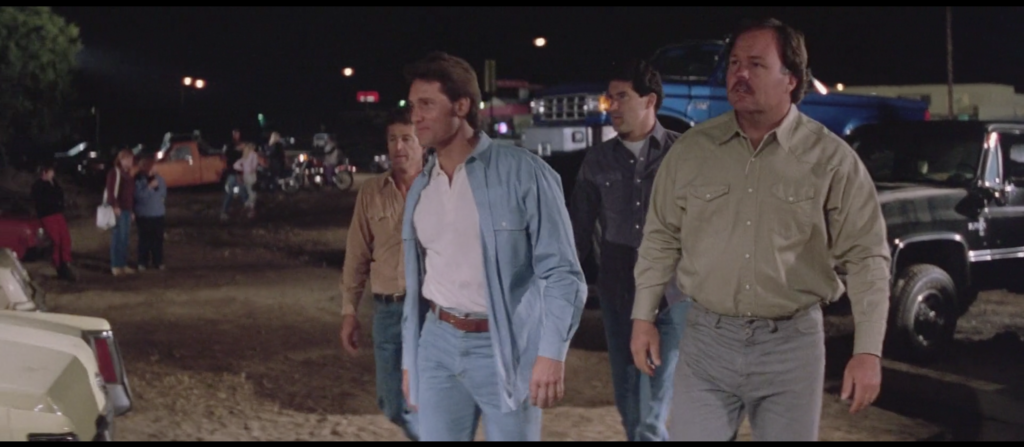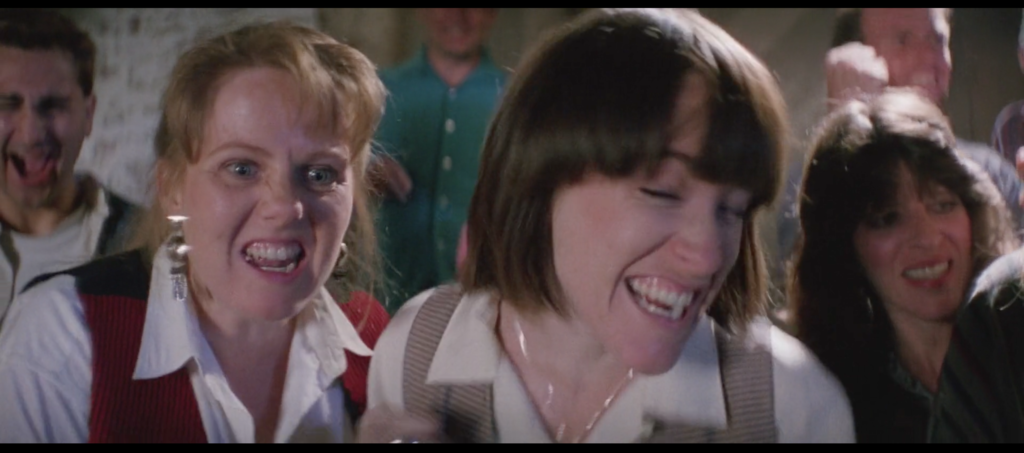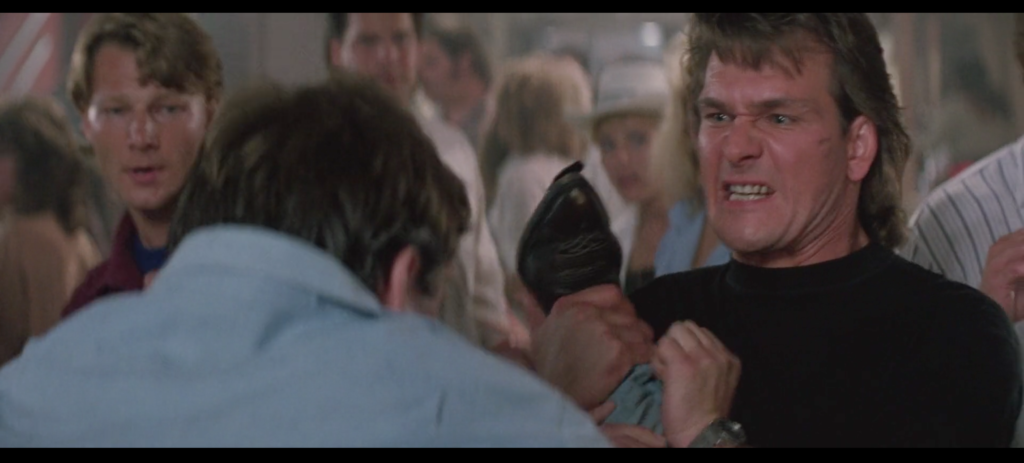Posts Tagged ‘the double deuce’
196. Hotbox
July 15, 2019At the end of a long, close to perfect night, the Double Deuce is smokin’. Literally. After the evening represented by the “Roadhouse Blues” scene winds to a close, Dalton stumbles through the big red double doors of the Double Deuce in a cloud of smoke. He rubs his eyes, as if they’re dry and irritated. He breathes out a plume of smoke himself. “Cigarettes and exhaustion” is surely what director Rowdy Herrington and company were going for; “Raindrop, drop top, smokin’ on cookie in the hotbox” is what many a viewer receives. If you’d slapped some designer sunglasses on him, replaced his shapeless beige sport jacket with a fur coat, and shot this in slow motion it’d look like an old Snoop Dogg video. That image and vibe is certainly preferable to the alternative, which is that to get rid of the smell of cigarettes he’d probably need a Silkwood shower. But he’s not one to get rid of the fragrances of nature, to use Emmett’s memorable phrase, and in Dalton’s world the constant presence of lit ciggies is as natural as it gets. More than once we see him light up without even bothering to put a shirt on first. The man has his priorities. And you know what they say about where there’s smoke.
195. Roadhouse Blues
July 14, 2019The Doors are good. They’re a good band, I’m sorry. Break On Through, Light My Fire, Touch Me, L.A. Woman, People Are Strange, Alabama Song, The End, Riders on the Storm, Love Me Two Times, Hello I Love You, Roadhouse Blues—guess what, that’s a good band! That’s more bangers in four years than Eric Clapton has across all of his projects in a decades-long career combined (for the record: Layla, Bell Bottom Blues, White Room, Tales of Brave Ulysses, Crossroads, Sunshine of Your Love, I Feel Free, Badge, While My Guitar Gently Weeps, Cocaine, and most of those were written by people not Eric Clapton), and I’m not even digging particularly deep. It’s not a Creedence Clearwater Revival’s contemporaneous California run of absolutely miraculous hitmaking, but it’s up there. The insistence that the Doors are a gigantic joke, a dorm-room poster posing as a band, a faux-poetic wet fart—it’s childish, tbh. It’s jejune. It’s “except rap and country,” it’s “Ringo was a bad drummer,” it’s a YouTube comment complaining that today’s music just can’t compare. It’s so, so freeing to leave it behind and fucking bellow YOU KNOW THAT IT WOULD BE UNTRUE! in that final verse as you sing along in the car or just shred BREAK ON THROUGH TO THE OTHER SIDE! at karaoke or whatever. Godfathers of goth along with the Velvet Underground as well. If the Doors were good enough for David Bowie, who loved them, they’re good enough for you too. We have Kiss and Bon Jovi and the Eagles (excepting the song Hotel California and the solo stuff) to kick around. Leave Mr. Mojo Risin’ alone!
I say all that to say this: The Jeff Healey Band really kill it on “Roadhouse Blues.” It’s the most natural fit possible for the movie (duh), for Healey’s more high-energy Stevie Ray Vaughn thing, and for a solo so hot you can all but smell smoke rising from the guitar he holds on his lap. It also loses the scat-singing portion of the song, which is probably one of the reasons you hate the Doors if you hate the Doors. They do it well enough that you could actually conceive of a full nightclub dancing to “Roadhouse Blues” by the Jeff Healey Band, and I mean dancing their asses off, or their gaucho hats, whichever comes first, which they do. LET IT ROLL, BABY, ROLL! LET IT ROLL….ALL NIGHT LONG!
194. Gaucho
July 13, 2019I’ve paid close attention to the “Roadhouse Blues” scene because it’s the Road House Universe’s ideal state. It comes right after the centerpiece scene, in which Dalton switches from being nice to not being nice, from treating it as a job to treating it as something personal. It features “Roadhouse Blues” by the Doors, essentially the film’s title track. Dalton spends practically the entire scene smiling, indicating all is right with him. There are no fights, no arguments, no interlopers. The whiskey’s running low, but it’s not running out, and Dalton’s going to take care of it with that phonecall of his. Frank Tilghman’s actions bear special scrutiny, as discussed, but that only emphasizes the scene’s importance. After all, even he admits he has the place just the way he wants it. Everything going on here is important.
So what’s with all the gaucho hats?
Not one, not two, but three separate revelers are wearing wide, flat-brimmed black hats as they dance and carouse. The young lady in green is easy enough to miss until the woman in maroon and the gentleman in the bolo tie leap out of the screen at you as the camera whirls around them while they dance and you’re like “wait—are these…different people dressed like Zorro?” The answer is yes, they are. (Technically Zorro wears a Cordovan sombrero, which is of a different provenance and region than the gaucho hat, but the two have blended together over time in the public imagination so I’m using the terms interchangeably. I hope you’ll pardon this slight license. Clarity trumps strict accuracy sometimes, that’s just how it works. It’s a job. It’s nothing personal.)
Why are three different people wearing black gaucho hats, though? Is this a cue that Dalton is a Zorro-esque figure, wealthy due to the proceeds of his in-demand cooling services yet still a man of the people, going outside the law to defend them from the depredations of bandits and landowners? I think that’s possible. I think it’s also possible that the costume department had a lot of these because someone was like “It’s kind of like a Western” but cowboy hats were decided against and this was the compromise. I think it’s possible that the hats were considered on-trend, as a little research indicates Yves Saint Laurent was incorporating them into his line at the time. I think it’s also possible that there’s no rhyme or reason to it whatsoever, and that a crucial tone-setting scene in the film Road House just so happens to have three people wearing black gaucho hats right in front of the camera. Bodacious cowboys such as themselves will always be welcome here, high in the Jasperdome.
192. ‘Whiskey’s Running Low’: The Tragedy of Keith David in ‘Road House’
July 11, 2019The man in the red shirt is Keith David. You may remember him from his roles in John Carpenter’s The Thing and They Live, two of the best science fiction and horror films ever made. In each he plays the main foil to the protagonists—rough-hewn salt-of-the-earth working-class white-guy types, with tough-as-nails attitudes and impressive heads of brown hair, who find themselves unexpectedly drawn into conflict with forces larger than themselves. Road House, you’ll note, stars Patrick Swayze as a rough-hewn salt-of-the-earth working-class white-guy type, with a tough-as-nails attitude and an impressive head of brown hair, who finds himself unexpectedly drawn into conflict with a force larger than himself.
Naturally, in Road House, Keith David plays a bartender whose sole line of dialogue is “Whiskey’s running low.”
That’s not quite all there is to the role. His name, uttered by both Tilghman and Dalton in this scene, is Ernie, and getting named is an honor precious few supporting characters in this film enjoy. He’s mentioned by name more than all the other bouncers and bartenders and waitresses still employed by the Double Deuce at this point in the film combined, save for Carrie Ann, who says her own name and gets it yelled at her by Pat McGurn. Everyone else? Bupkis.
What’s more, he’s listed with a surname in the closing credits. This too is more than can be said for virtually anyone in the movie. Jimmy, for example, went by “Jimmy Reno” during filming—you can find interview clips with Patrick Swayze in which he calls that character by name, it comes up frequently in interviews with actor Marshall Teague, and it’s in the IMDb listing—but is merely “Jimmy” in every official respect. Dalton himself only gets a mononym unless you inspect his medical file.
Most strikingly, Keith David appears in the opening credits. He’s billed fifth, after only Patrick Swayze, Ben Gazzara, Kelly Lynch, and Kevin Tighe, and just before Kathleen Wilhoite. The actors who play Emmett, Red, and Denise all get lumped together in a single triple chyron, which is fair enough. Sam Elliott gets a “And SAM ELLIOTT” to conclude the cast listing, which is appropriate. Jeff Healey slides in later on via an “Featured Music Performance by The Jeff Healey Band” slug. Other characters you think might reasonably get listed up front—Jimmy, Tinker, O’Connor, Ketchum, Morgan, Pat, Jack—aren’t there at all. Ernie’s fellow bartender, who’s there since the beginning, is entirely uncredited.
If you’ve watched David deftly dance between antagonist, supporting character, and stealth protagonist in The Thing, or if you’ve watched his world-building alley fight with “Rowdy” Roddy Piper in They Live, you probably have some questions about all this. God knows I do.
As best I can ascertain, partially from half-remembered poorly sourced comments in various Road House posts across the internet, and partially based on my own conjecture, is that Ernie Bass was originally a much more prominent character, the bulk of whose storyline wound up on the cutting room floor. I suspect he was a famous bartender, whom Dalton brought in to elevate the Double Deuce’s standing further still—surrounding himself with a surrogate family of old friends which also included Cody, his bandmates, and Wade Garrett. While the material was cut for time, contractual obligations kept David in the picture and in the credits.
A questionable decision, to be sure. Were David cast in a fighting role he’d be an invaluable asset to the film, and even as simply a gnomic presence dispensing basso profundo wisdom behind the bar he’d be a huge get. Instead? He hands Dalton a coffee with a nod of acknowledgement. He tells Tilghman “Whiskey’s running low.” He hands Dalton a phone. He looks at Wade Garrett. He looks at Wade and Dalton together. Exit Ernie Bass, pursued by an editor.
189. All Smiles No Blues
July 8, 2019A partial list of things Dalton smiles at during the “Roadhouse Blues” scene in Road House:
- The parking lot
- The crowd waiting in line to get in
- The guy counting attendance
- Jack the bouncer
- The crowd to his left
- The crowd to his right
- The Jeff Healey Band
- The pool table area
- The dining area
- The crowd at the bar
- Ernie the bartender
- His coffee
- The crowd on the dancefloor
- Frank Tilghman
- The prospect of taking care of Frank Tilghman’s problems
And the night is still young for him, too! By the time it’s over he’ll also have smiled at Dr. Elizabeth Clay in his parking lot, Dr. Elizabeth Clay in his apartment, Dr. Elizabeth Clay in her car which he’s driving, Otis Redding on the radio, Dr. Elizabeth Clay on his erect penis, and Dr. Elizabeth Clay nude on his roof. (Otis seems like the odd man out there until you consider his vital role in that particular progression.) None of these smiles are sardonic or wry. None are directed at stop signs torn from the ground and speared through his car windows, or at people who have or soon will have tried to stab him to death. These are genuine smiles of happiness, from a man who finds himself surrounded with the best things in life: happy crowds, good drinks, admiring proteges, soul music (blue- and brown-eyed varieties), Kevin Tighe, open-roofed motor vehicles, public nudity, the welcoming sex organs of a beautiful woman with a doctorate degree. The Dalton Path leads to a far green country.
188. That’s Road House
July 7, 2019I wasn’t joking when I joked yesterday that the road house we see when Jeff Healey starts playing the Doors’ “Roadhouse Blues” *is* Road House. Say what you want about the writing of this movie, but there’s almost always some serious narrative logic behind the editing of it—of which image follows which line, of which scene arrives at which moment. We saw it with Brad Wesley’s breakfast, the literal center of the film, before which Dalton is nice and after which Dalton is not nice. We saw it very early on, when director Rowdy Herrington’s credit appears immediately between Terry Funk yelling “DON’T COME BACK, PECKERHEAD!” at a man he just bodily threw through the doors of the Double Deuce and that shirtless yahoo boogieing on down in front of the chickenwire-wrapped stage. And we see it again here, when right after Dalton announces in no uncertain terms that he’ll never work for Brad Wesley, “Roadhouse Blues” plays over the debut of the new, remodeled Double Deuce in the very next shot. The scene that then takes place shows the bar as Frank Tilghman intended it to be—packed to the rafters, everyone happy, no one fighting (or shirtless). The booze is running low thanks to Brad Wesley’s blockade of distribution, but no violence breaks out and nothing breaks up the party. Everything else is going exactly the way the decision to hire Dalton to clean the place up was meant to ensure. Everything works. That’s the endpoint of the Dalton Path. That’s Road House.
186. [whispering to date while watching Road House when Road House first appears on the screen]
July 5, 2019180. Three Imaginary Boys
June 29, 2019Brad Wesley is not the only character in Road House in whose eyes Dalton is but a boy. Three others label him as such, and they could not be more different in tone and intent.
First up is Red Webster, one of the Four Car Salesmen of Jasper, Missouri. An avuncular presence in the film—literally: He is Dr. Elizabeth Clay’s uncle—he asks if Dalton is “the boy from the Double Deuce” when our hero shows up at his store before it opens to have various parts of his car replaced. Just a friendly, getting-to-know-you inquiry, from a guy calling another guy “boy” because he’s younger and he’s just arrived in town. Here, “boy” connotes “newcomer,” someone who is experiencing the world around him with fresh eyes, and who finds himself welcomed by those around him. Excepting the clientele of the Double Deuce as currently constituted, of course.
Next is Jimmy, Brad Wesely’s right hand and bastard son [source for this claim?]. “Your ass is mine, boy,” he growls, gesticulating for emphasis in case the owner of the ass of which he is claiming emphasis was unclear. Wesley has just stopped Jimmy from taking on a roughed-up Wade Garrett and a fresh-to-the-fight Dalton 2-to-1 in the Double Deuce, the night Wesley’s men blow up Red Webster’s store and Denise does an aggressive striptease to further assert Wesley’s dominance or something. Here, “boy” means a man less experienced, less tough, less dangerous, less of a man; Jimmy will use the term again when he sneers at Dalton’s fighting prowess during their eventual mano a mano showdown. (His father, spiritually anyway if not biologically, Brad Wesley will pick up the ass-owning baton and run with it, by the way, but not before Jimmy returns to that well implicitly when describing what he used to do to guys like Dalton in prison.)
The third and final boy-sayer is Wade Garrett. Staggering into the Double Deuce the night after Dalton kills Jimmy, Wade has been badly wounded in a fight with three unspecified Wesleyan goons. Dalton realizes that if Wade is still alive, it could be that the hammer is slated to fall on Elizabeth. He rushes out to find her, but not before assuring Wade that he will grant his mentor’s wish at last: They will leave this town and never look back, allowing Wesley to win rather than keep up a fight that by rights isn’t theirs. Wade looks up at the younger man and smiles. “Attaboy, mijo,” he says. Mijo, of course, means “son”; this is the “boy” of approval, of pride, of love. This is the “boy” of a dying parent’s love for his only child.
173. And that’s tea
June 22, 2019166. Details
June 15, 2019As a visual text, Road House is a chest of wonders. Look at this shot from early on in the film, on the night when Dalton first visits the Double Deuce. There he is at his familiar post, in his familiar shapeless beige jacket. There’s Pat McGurn and The Bartender Who Must Not Be Named behind him, conferring about whatever a sister-son and a working stiff who both happen to have the same job at the same place might confer about. (“So what’s it like working with Exene after the divorce? And this Mortensen kid she’s with, is he cool? Because he seems cool.”)
To the left is a power drinker, passed out on the bar; from this we can infer that Pat, ever conscious of the needs of his uncles liquor distributorship, refuses to cut off even the most obviously inebriated patrons, and most likely pressures the Nameless One into doing the same. Given the behavior of the comparatively sober customers, what does he have to lose, really.
To the right is a detail I’m just now noticing: the dry spongy exposed foam of the bar’s padding, chipped and peeled and torn away by the half-hearted vandalism of the drunk and the fixated. Back in the “everything is padded” days of restaurateurship, such artifacts of idle destructiveness were visible everywhere. I haven’t sat on an upholstered seat at an upholstered table in many a long year, but I can feel the satisfaction of ripping away a chip of covering and pulling at the porous brown stuffing underneath like my hands are doing it right now instead of typing this sentence. For all that Road House is rightfully dinged about its lack of realism, even as regards bar furniture specifically (the price of replacement tables alone from the fight about to ensue would put a normal establishment out of business), that’s some real shit.
And to the right of that? Why, that familiar fellow is none other than Brad Welsey’s own Tinker. Has he come to chat with fellow Wesleyans Pat and Morgan about the art of the goon over a few drinks when they have a moment to spare during their busy evenings of stealing from the cash register and erupting into violence over the slightest provocation? Is he additional muscle to make sure Mr. Wesley’s liquor flows without impediment? Is he simply a fan of the Jeff Healey Band? At another time during this sequence he’s seen chatting up some lovely lady; is the Double Deuce his fern bar, his Regal Beagle? Is this Tinker Tinder?
I’m reminded here of the extensive making-of documentaries included in the Lord of the Rings extended edition sets. I don’t remember the exact wording offered by the heads of the various costume and design and set departments regarding their lunatic attention to detail. I do remember the gist of it, though: They would produce intricate designs for the insides of garments and scabbards or for swords that would only be seen from a distance or for rooms no one would even enter or what have you not because the audience would see them, which they knew they wouldn’t. They did so because they were creating a world for the entire production to inhabit, not just the viewer. A cast or crew member who spent a few seconds admiring the embroidery of their breeches would be that much closer to convincingly conveying the reality of a world of orcs and elves and hobbits and magic rings. Look at the shot above, really look at it, and tell me if he war between the world’s most famous bouncers and the maniac mall devleoper who keeps their bar in Jim Beam seems as much of a stretch as it did before.
162. Kiss
June 11, 2019Dalton and Elizabeth’s first kiss is as much a kiss of acceptance as of romance. Their awkward, oddly hostile first date concluded, they have returned to the parking lot of the Double Deuce so Dalton can pick up his car to drive it back to Emmett’s ranch. They find its tires flattened and its window impaled with an uprooted stop sign. Doc, quick-witted as ever, quips “Your fan club?”
“They are devoted,” Dalton chuckles.
“You live some kind of life, Dalton.” This is delivered as a summation of the night’s conversation. Whether he’s ever been bested, ever been put down, ever wondered why, ever thought about the morality of accepting money to beat people, ever considered whether or not his nice guy act works—in seeing that ruined car Elizabeth appears to realize that these questions are moot. Dalton is a man willing to martyr himself so the kinds of people who’ll fuck up some guy’s car just for doing his job don’t get to do it to other people more vulnerable, less capable of fighting back. She heeds the stop sign, in other words, and lays her doubts to rest, for now anyway.
Dalton doesn’t know this yet. He sees his ruined car and sees, well, a ruined car. Now that part of his life has been displayed to the Doc, along with his battered body. It isn’t a pretty picture. (Not even his perfect physique is necessarily that impressive to someone who’s stapled it shut.)
“Too ugly for you,” he says. In classic Road House fashion this is a statement, not a question. He’s offering an answer of his own.
Then comes the happy surprise, the eucatastrophe, from the mouth of the Doc: “I didn’t say that.”
The kiss that follows (after some awkward seatbelt fumbling) is soft, nearly chaste, one sustained contact with the lips and then a release. It’s a benediction. So much is said with this one kiss that when the time comes for Dalton and Elizabeth to make love, neither feels the need to kiss again until the act has been consummated. To the extent that a kiss is the physical expression of intimacy, what can be more intimate than “I understand”?
158. Salute
June 7, 2019Some men see a bouncer who gets paid a low-mid six-figure yearly salary to beat up the agents of a local racketeer with a Fotomat in a dirt-parking-lot dive-bar shithole in Jasper Missouri conclude a date during which he got read to filth to his face multiple times by a woman he met in a trauma ward when she stapled his latest stab wound shut without anesthesia before showing up to their date while he was in the middle of a street fight by giving her a chaste kiss on the lips and then saying goodbye with a weird little half-assed naval salute while holding the stop sign his enemies jammed through his car window after slashing all his tires and say, why; I watch Road House and say, why not?
151. You simply hate to see it
May 31, 2019The Doc is no fan of barfights. Good heavens no! Not even the ones that take place in parking lots outside the bar and thus run less risk of concussions on tables and whatnot. I mean, look at her! Here she is, sauntering up to the Double Deuce in her finest gingham clubwear, absolutely shocked and appalled and a little bit disgusted and a tiny tad outraged to see that a bar so well known for its barfights that she cracks jokes about it to patients who’ve incurred injuries there is hosting a barfight. Treating the wounded is one thing, but watching the wounding is quite another, apparently! Anyway in about a minute she’ll make googly eyes at the winning combatant and tell him he’s what she’s looking for, so she gets over it. You could probably chalk up the disconnect to Rowdy Herrington directing Kelly Lynch like a showdog rather than a human actor, you can probably hear him say “You’re disgusted, you see it and you can’t believe it, you’re wincing it’s so painful even to look at” and her thinking well it’s a living and giving him that ooooh face with all she’s got. But that is the coward’s way. Here at Pain Don’t Hurt we attribute agency to accident and thus we can interpret this as Dr. Elizabeth Clay blanching at the sight of the source of her income stream. Given that she was once married to Brad Wesley it’s not a half-bad interpretation, when you get right down to it. Dr. Elizabeth Clay is a student in the art of ignoring the obvious until it’s too late to look away.
142. The Doctor Is In
May 22, 2019“horny” has killed more people than all the volcanos on earth combined —@dril
“I just think I’m looking at a dead man, though.” —Carrie Ann
By the standards established by these eminent students of the human condition, I would like to report at least three murders committed by Dr. Elizabeth Clay in the very first moment we see her on this fateful night. There’s the galoot in the wifebeater, Bobby Axelrod, and another guy right behind her who’s about to pay the iron price for having the best seat in the house. Worth it!
Despite being terminally horny, I don’t often write about it anymore because it seems…I dunno, both distasteful, coming from a person in my privileged position, and superfluous, since now every single human being above the age of about 16 with an Internet connection is writing things like “I want Timothee Chalamet to rip out my esophagus and toss me into a nearby body of water to float downstream face-down” every two seconds. I made an exception for Carrie Ann in what is and remains the hottest goddamned moment in any move I’ve ever seen, of course. In a more abstract way I talk about how attractive Denise and Dalton are, although Denise doesn’t hit me where I live so to speak, and I’m too tediously straight to feel legit randy towards even Patrick Swayze in his prime.
But I am unashamed to say that my first thought every time I see the Doc make her grand entrance in the middle of Dalton’s parking-lot brawl against Boot-Knife Ketchum and the Goon Guys Present The Sounds of Barbershop is a spit-take, a low whistle, that springy series of noises when a machine malfunctions in a Looney Tunes short, va-va-fucking-va-voom.
My second thought: Why is she wearing a picnic blanket, and why does her hair look like what happens when you lose the ponytail accessories for an old Barbie doll? Because man alive, that is an odd dress, and that blonde lizard frill sticks out like it broke free of her earlier French braid on its own steam. It’s wild.
It’s to the Doc’s testament that she can make it work. Her body is nearly as nuts as Dalton’s is, that much we can gather, and we’ll get a better look at it later still. Both she and Kelly Lynch, the actor who plays her, are both very pretty women, with a face that seems severe until she smiles, at which point it’s open and warm and kind of adorable. There’s a bit later in the film where Dalton razzes her and she kind of open-palm smushes his face, and that goofy sweet horseplay makes sense the moment she grins.
But the dress commands the eye in the end, and it’s what makes her entrance so striking. Even among the hooting and hollering heteros with whom I first watched the movie, the drunken “Hel-looooo nurse!“s were quickly followed by “What the hell is up with that dress?”, but you’ll notice the order of the two exclamations. When you see this extremely accomplished person—her accomplishments are all we know about her at this point—arrive in clothes that make this loud a statement, you wind up not caring much that the statement is borderline incomprehensible. You just think “How can I meet and entertain and hopefully impress this person without fucking up? She’s a surgeon in a gingham mini for chrissakes!”
Considering how badly Dalton bobbles the first date (though as it turns out he doesn’t bobble it half as badly as it seems at first blush) this appears to have been his primary response as well. It’s unnerving, I’d imagine, to have just finished kicking the asses of four men sent to murder you and then still find yourself several score professional and sartorial steps behind a person who just showed up to take you on a date. Your rules won’t help you now.
135. Captain
May 15, 2019See this fellow on the right? The mustachioed gentlemen wearing his shirt tucked in with no belt? He’s played by a football player turned stuntman, stunt coordinator, actor, and second unit director named Allan Graf. With that series of job descriptions you might expect him to have played a role in other fight scenes besides the one where Dalton disarms, or dislegs I suppose, a guy with a knife embedded in his boot. And you’d be right.
Graf is also Captain Joe Turner, bodyguard and enforcer for George Hearst, in Deadwood, another Western largely shot in bars about people jockeying for control of a small town overrun by a rich asshole. As such he is one half of the best fight scene ever filmed: the street fight against Dan Dority (W. Earl Brown), the Captain’s opposite number in local pseudo-respectable crime boss Al Swearengen’s outfit. I’ll never forget the first time I watched this scene because after it was over I had a splitting headache. Was it sympathy pain, I wondered, until I realized I’d been holding my breath for probably a minute and a half before the tide, as it were, turned in the favor of my favored combatant. I was so on edge I literally stopped breathing.
As much as I think the fight scenes in Road House are fantastically choreographed, acted, and shot, nothing in the film rises to that level. But that’s fine, as few fight scenes ever have. And for what it’s worth, the eventual mano a mano between Dalton and Jimmy is legit one of the most exciting and technically fantastic fights I’ve ever seen in a movie. But without the pathos generated by David Milch’s town full of grasping ravenous brutes and people who get so angry at the resultant shit through which they’re forced to wade that they start to cry, it’s simply playing a different sport than the one for which Mr. Allan Graf got down in the mud as one half of the greatest game ever played.
134. Nobody ever wins a fight?
May 14, 2019Here are Stella and Carrie Ann, the waitstaff at the Double Deuce, watching Dalton, Jack, Hank, and Younger, the bouncers at the Double Deuce, whip the shit out of Ketchum and his pals, would-be assassins at the Double Deuce. They leer and cheer from the sidelines like extras shown in slo-mo during a Rocky movie when someone’s getting absolutely beaten senseless, only they’re not in slo-mo, they’re in glorious real time. Representative dialogue: “GO ON GO KICK HIS AAASSSSSS!” When the dust settles and the last man goes down you can hear Carrie Ann’s distinctive white-soul rasp: “ALLLRIGHT! YEAH!” She sounds as satisfied as Matthew McConaughey lighting a spliff after having sex for two hours.
And why shouldn’t she? Carrie Ann, we’ve seen, was the victim of sexual harassment we can safely assume was constant until Dalton showed up and announced “It’s going to change.” Stella was almost certainly in the same boat. For untold years, these two women had to take drink orders from men who would convert those drinks into that many more ass-pinches and face-punches. We’ve watched both women resort to using beer bottles as weapons to try and stem the tide of violence in their own favor.
The Double Deuce was an absolute hellhole, a Missouri Mos Eisley Cantina, the Inn at the Crossroads during Lannister rule, Rick’s if Bogey was playing his character from In a Lonely Place and Peter Lorre was the child killer from M and Claude Rains was the Invisible Man. It was a hideous, soul-destroying place to work. It’s a miracle these women made it out emotionally intact.
But it ain’t like that anymore, and I can’t imagine Carrie Ann and Stella are nuts about anyone who’d like to restore that particular status quo ante. They recognize Ketchum and his church potluck pals for what they are. You see in their faces and hear in their voices the hunger of people who are finally getting to see their oppressors get theirs. I’d like to see these faces and hear these voices much, much more often.
128. “You’re too stupid to have a good time!”
May 8, 2019When Ketchum and the boys from the Tuesday night Good Book, Good Burgers combination Bible study & barbecue men’s meeting show up to kick-stab Dalton in the skull for the crime of firing Brad Wesley’s nephew and then beating him and his buddies up after they attempt to stab Dalton in the face and torso over it, Dalton is ready. Arrayed Avengers-style, he and the other bouncers tell the new visitors that the Double Deuce is closed. You’ve got to get up pretty early in the morning to fool Ketchum, however, who notes that the bar is full of people and demands to know what they’re doing. Dalton merely points out the obvious, which is that they’re “drinking and having a good time.”
“Well, that’s why we’re here,” says Ketchum, grinning, before whipping his leg straight up in the air to enziguri Dalton…with extreme prejudice.
Alas for the goon! Dalton is quicker of reflex than his assailant, which he demonstrates by catching Ketchum’s leg in midair. But he is also quicker of wit, which he demonstrates with a first-ballot Hall of Fame Road House one-liner: “You’re too stupid to have a good time!”
Dalton proceeds to QED Ketchum’s ass by dragging him into the parking lot and whipping him and his buddies but good. All is well, one would think.
But one would be wrong. Just over two weeks into this project we discussed The Shirtless Man. Much like the Green Man, the woodwose, or Dionysian mystery cults, this figure of fertility and abandon is, along with his demonic/cthonic opposite number Morgan, our introduction to the world of the Double Deuce. I won’t insult your intelligence by belaboring a point you can grasp with your own two eyes immediately: The Shirtless Man is extremely stupid, and he’s having the time of his life. Indeed much of the clientele of the bar when Dalton arrives to work there—the very same people Dalton is intent upon clearing out—are both as dumb as pillowcase full of doorknobs and as happy as pigs in shit. There’s no other way to put it: Dalton is wrong.
But in this rare instance, Dalton’s maxim reflects the world not as it is, but as he is determined to make it be. His task here is not to fix something broken according to the ways of the Dalton Path, but to break something intact so that the Dalton Path may proceed. He is changing the pig himself this time, creating the conditions under which “You’re too stupid to have a good time” is true. The Three Simple Rules, “Pain don’t hurt,” and the like are matters of observation; “You’re too stupid to have a good time” is a matter of application.
In short, we have reached the start of the Dalton Path’s rockiest stretch, and we will see Dalton pushed to the breaking point as a result before he emerges stronger on the other side. We are privy to a great becoming.



